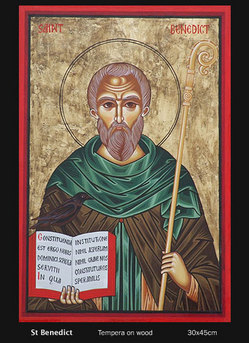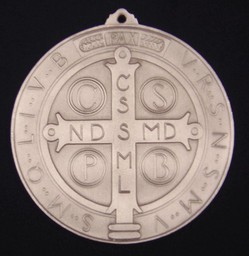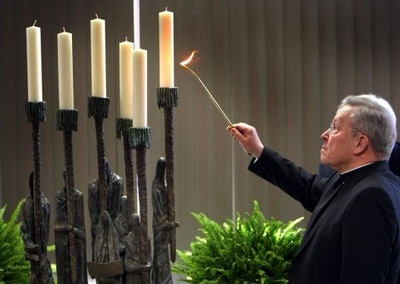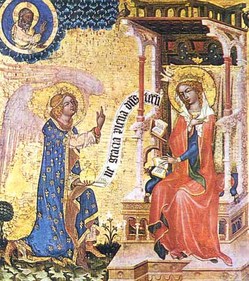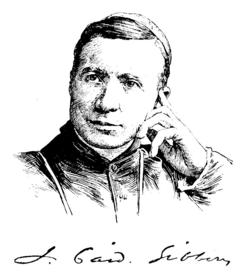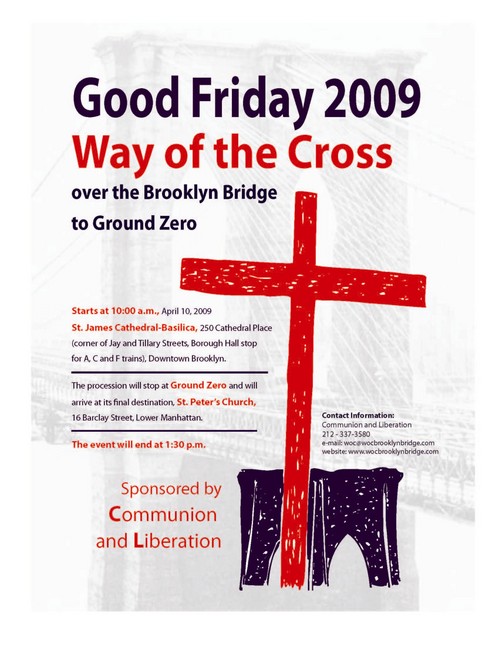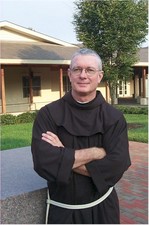A brief note and another on Newt Gingrich's entering into full communion with the one, true Church.
March 2009 Archives
Here is a wonderful story of an icon writer from
Silvia Dimitrova's webpage can seen here.
May God grant Silvia many years!
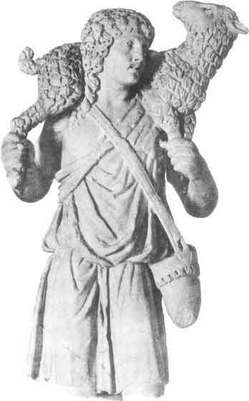 On the occasion of the next World Day of prayer for vocations to the priesthood and to the consecrated life, which will be celebrated on
On the occasion of the next World Day of prayer for vocations to the priesthood and to the consecrated life, which will be celebrated on
The vocation to the priesthood and to the consecrated life constitutes a special gift of God which becomes part of the great plan of love and salvation that God has for every man and woman and for the whole of humanity. The Apostle Paul, whom we remember in a special way during this Pauline Year dedicated to the Two-thousandth anniversary of his birth, writing to the Ephesians says, "Blessed be the God and Father of our Lord Jesus Christ, who has blessed us in Christ with every spiritual blessing in the heavenly places, even as he chose us in him before the foundation of the world, that we should be holy and blameless before him" (Ef 1:3-4). In the universal call to holiness, of particular relevance is God's initiative of choosing some to follow his Son Jesus Christ more closely, and to be his privileged ministers and witnesses. The divine Master personally called the Apostles "to be with him, and to be sent out to preach and have authority to cast out demons" (Mk
Our first duty, therefore, is to keep alive in families and in parishes, in movements and in apostolic associations, in religious communities and in all the sectors of diocesan life this appeal to the divine initiative with unceasing prayer. We must pray that the whole Christian people grows in its trust in God, convinced that the "Lord of the harvest" does not cease to ask some to place their entire existence freely at his service so as to work with him more closely in the mission of salvation. What is asked of those who are called, for their part, is careful listening and prudent discernment, a generous and willing adherence to the divine plan, and a serious study of the reality that is proper to the priestly and religious vocations, so as to be able to respond responsibly and with conviction.
The Catechism of the Catholic Church rightly reminds us that God's free initiative requires a free response on the part of men and women; a positive response which always presupposes acceptance of and identification with the plan that God has for everyone; a response which welcomes the Lord's loving initiative and becomes, for the one who is called, a binding moral imperative, an offering of thanksgiving to God and a total cooperation with the plan which God carries out in history (cf. n. 2062).
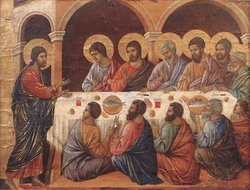 Contemplating the mystery of the Eucharist, which expresses in a sublime way the free gift of the Father in the Person of his Only Begotten Son for the salvation of mankind, and the full and docile readiness of Christ to drink to the dregs the "cup" of the will of God (cf. Mt 26:39), we can more readily understand how "faith in the divine initiative" models and gives value to the "human response". In the Eucharist, that perfect gift which brings to fulfilment the plan of love for the redemption of the world, Jesus offers himself freely for the salvation of mankind. "The Church", my beloved predecessor John Paul II wrote, "has received the Eucharist from Christ her Lord not as a gift - however precious - among so many others, but as the gift par excellence, for it is the gift of himself, of his person in his sacred humanity, as well as the gift of his saving work" (Ecclesia de Eucharistia, 11).
Contemplating the mystery of the Eucharist, which expresses in a sublime way the free gift of the Father in the Person of his Only Begotten Son for the salvation of mankind, and the full and docile readiness of Christ to drink to the dregs the "cup" of the will of God (cf. Mt 26:39), we can more readily understand how "faith in the divine initiative" models and gives value to the "human response". In the Eucharist, that perfect gift which brings to fulfilment the plan of love for the redemption of the world, Jesus offers himself freely for the salvation of mankind. "The Church", my beloved predecessor John Paul II wrote, "has received the Eucharist from Christ her Lord not as a gift - however precious - among so many others, but as the gift par excellence, for it is the gift of himself, of his person in his sacred humanity, as well as the gift of his saving work" (Ecclesia de Eucharistia, 11).
It is priests who are called to perpetuate this salvific mystery from century to century until the Lord's glorious return, for they can contemplate, precisely in the Eucharistic Christ, the eminent model of a "vocational dialogue" between the free initiative of the Father and the faithful response of Christ. In the celebration of the Eucharist it is Christ himself who acts in those whom he chooses as his ministers; he supports them so that their response develops in a dimension of trust and gratitude that removes all fear, even when they experience more acutely their own weakness (cf. Rm 8:26-28), or indeed when the experience of misunderstanding or even of persecution is most bitter (cf. Rm 8:35-39).
The awareness of being saved by the love of Christ, which every Mass nourishes in the faithful and especially in priests, cannot but arouse within them a trusting self-abandonment to Christ who gave his life for us. To believe in the Lord and to accept his gift, therefore, leads us to entrust ourselves to Him with thankful hearts, adhering to his plan of salvation. When this does happen, the one who is "called" voluntarily leaves everything and submits himself to the teaching of the divine Master; hence a fruitful dialogue between God and man begins, a mysterious encounter between the love of the Lord who calls and the freedom of man who responds in love, hearing the words of Jesus echoing in his soul, "You did not choose me, but I chose you and appointed you that you should go and bear fruit and that your fruit should abide" (Jn 15:16).
This intertwining of love between the divine initiative and the human response is present also, in a wonderful way, in the vocation to the consecrated life. The Second Vatican Council recalls, "The evangelical counsels of chastity dedicated to God, poverty and obedience are based upon the words and examples of the Lord. They were further commanded by the apostles and Fathers of the Church, as well as by the doctors and pastors of souls. The counsels are a divine gift, which the Church received from its Lord and which it always safeguards with the help of His grace" (Lumen Gentium, 43).
Once more, Jesus is the model of complete and trusting adherence to the will of the Father, to whom every consecrated person must look. Attracted by him, from the very first centuries of Christianity, many men and women have left families, possessions, material riches and all that is humanly desirable in order to follow Christ generously and live the Gospel without compromise, which had become for them a school of deeply rooted holiness. Today too, many undertake this same demanding journey of evangelical perfection and realise their vocation in the profession of the evangelical counsels. The witness of these our brothers and sisters, in contemplative monasteries, religious institutes and congregations of apostolic life, reminds the people of God of "that mystery of the Kingdom of God is already at work in history, even as it awaits its full realization in heaven" (Vita Consecrata, 1).
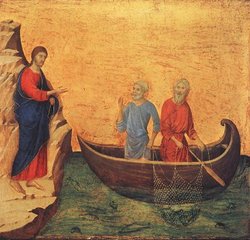 Who can consider himself worthy to approach the priestly ministry? Who can embrace the consecrated life relying only on his or her own human powers? Once again, it is useful to reiterate that the response of men and women to the divine call, whenever they are aware that it is God who takes the initiative and brings His plan of salvation to fulfilment, is never patterned after the timid self-interest of the worthless servant who, out of fear, hid the talent entrusted to him in the ground (cf. Mt 25:14-30), but rather expresses itself in a ready adherence to the Lord's invitation, as in the case of Peter who, trusting in the Lord' word, did not hesitate to let down the net once more even after having toiled all night and catching nothing (cf. Lk 5:5). Without in any sense renouncing personal responsibility, the free human response to God thus becomes "co-responsibility", responsibility in and with Christ, through the action of his Holy Spirit; it becomes communion with the One who makes it possible for us to bear much fruit (cf. Jn 15:5).
Who can consider himself worthy to approach the priestly ministry? Who can embrace the consecrated life relying only on his or her own human powers? Once again, it is useful to reiterate that the response of men and women to the divine call, whenever they are aware that it is God who takes the initiative and brings His plan of salvation to fulfilment, is never patterned after the timid self-interest of the worthless servant who, out of fear, hid the talent entrusted to him in the ground (cf. Mt 25:14-30), but rather expresses itself in a ready adherence to the Lord's invitation, as in the case of Peter who, trusting in the Lord' word, did not hesitate to let down the net once more even after having toiled all night and catching nothing (cf. Lk 5:5). Without in any sense renouncing personal responsibility, the free human response to God thus becomes "co-responsibility", responsibility in and with Christ, through the action of his Holy Spirit; it becomes communion with the One who makes it possible for us to bear much fruit (cf. Jn 15:5).
An emblematic human response, full of trust in God's initiative, is the generous and unmitigated "Amen" of the Virgin of Nazareth, uttered with humble and decisive adherence to the plan of the Most High announced to her by God's messenger (cf. Lk 1:38). Her prompt "Yes" allowed Her to become the Mother of God, the Mother of our Saviour. Mary, after this first "fiat", had to repeat it many times, even up to the culminating moment of the crucifixion of Jesus, when "standing by the cross of Jesus" as the Evangelist John notes, she participated in the dreadful suffering of her innocent Son. And it was from the cross, that Jesus, while dying, gave her to us as Mother and entrusted us to her as sons and daughters (cf. Jn 19:26-27); she is especially the Mother of priests and consecrated persons. I want to entrust to her all those who are aware of God's call to set out on the road of the ministerial priesthood or consecrated life.
Dear friends, do not become discouraged in the face of difficulties and doubts; trust in God and follow Jesus faithfully and you will be witnesses of the joy that flows from intimate union with him. Imitating the Virgin Mary whom all generations proclaim as blessed because she believed (cf. Lk 1:48), commit yourselves with every spiritual energy, to realise the heavenly Father's plan of salvation, cultivating in your heart, like her, the ability to be astonished and to adore him who is mighty and does "great things", for Holy is his name (cf. Lk 1:49).
From the
Benedictus PP. XVI
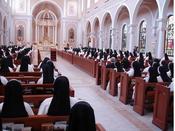 The Dominican Sisters of Saint Cecilia have a new, beautiful website. Visit them here.
The Dominican Sisters of Saint Cecilia have a new, beautiful website. Visit them here.
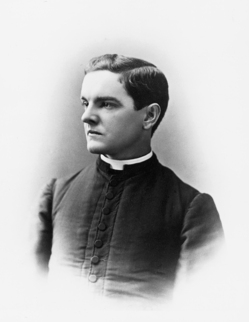 Today marks the 127th anniversary of the State of Connecticut granting a charter to the Knights of Columbus. The dream of a lay Catholic men's fraternity of the Venerable Servant of God Michael J. McGivney came true.
Today marks the 127th anniversary of the State of Connecticut granting a charter to the Knights of Columbus. The dream of a lay Catholic men's fraternity of the Venerable Servant of God Michael J. McGivney came true.
May God grant the Knights of Columbus abundant blessings!
Commentary on the Book of Numbers
Saint Cyril of
As the first-fruits of our renewed humanity, Christ escaped the curse of the law precisely by becoming accursed for our sake. He overcame the forces of corruption by himself becoming once more "free among the dead." He trampled death under foot and came to life again, and then he ascended to the Father as an offering, the first-fruits, as it were, of the human race. "He ascended," as Scripture says, "not to a sanctuary made by human hands, a mere copy of the real one, but into heaven itself, to appear in God's presence on our behalf." He is the life-giving bread that came down from heaven, and by offering Himself to God the Father as a fragrant sacrifice for our sake, he also delivers us from our sins and frees us from the faults that we commit through ignorance.
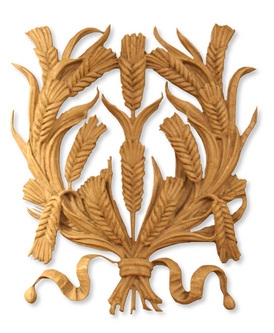 The human race may be compared to spikes of wheat in a field, rising, as it were, from the earth, awaiting their full growth and development, and then in time being cut down by the reaper, which is death. The comparison is apt, since Christ Himself spoke of our race in this way when He said to His holy disciples: "Do you not say, 'Four months and it will be harvest time?' Look at the fields I tell you, they are already white and ready for harvesting. The reaper is already receiving his wages and bringing in a crop for eternal life."
The human race may be compared to spikes of wheat in a field, rising, as it were, from the earth, awaiting their full growth and development, and then in time being cut down by the reaper, which is death. The comparison is apt, since Christ Himself spoke of our race in this way when He said to His holy disciples: "Do you not say, 'Four months and it will be harvest time?' Look at the fields I tell you, they are already white and ready for harvesting. The reaper is already receiving his wages and bringing in a crop for eternal life."
Now Christ became like one of us; He sprang from the holy Virgin like a spike of wheat from the ground. Indeed, He spoke of Himself as a grain of wheat when he said: "I tell you truly, unless a grain of wheat falls into the ground and dies, it remains as it was, a single grain; but if it dies its yield is very great." And so, like a sheaf of grain, the first-fruits, as it were, of the earth, he offered Himself to the Father for our sake.
For we do not think of a spike of wheat, any more than we do of ourselves, in isolation. We think of it rather as part of a sheaf, which is a single bundle made up of many spikes. The spikes have to be gathered into a bundle before they can be used, and this is the key to the mystery they represent, the mystery of Christ who, though one, appears in the image of a sheaf to made up of many, as in fact he is. Spiritually, He contains in Himself all believers. "As we have been raised up with Him," writes
The Royal Banner forward goes,
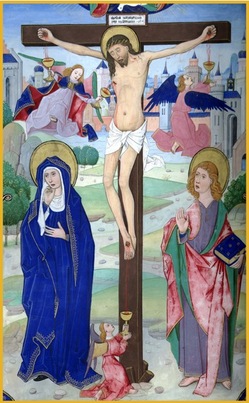 The mystic Cross refulgent glows:
The mystic Cross refulgent glows:
Where He, in Flesh, flesh who made,
Upon the Tree of pain is laid.
Behold! The nails with anguish fierce,
His outstretched arms and vitals pierce:
Here our redemption to obtain,
The Mighty Sacrifice is slain.
Here the fell spear his wounded side
With ruthless onset opened wide:
To wash us in that cleansing flood,
Thence mingled Water flowed, and Blood.
Fulfilled is all that David told
In true prophetic song, of old:
Unto the nations, lo! saith he,
Our God hath reignèd from the Tree.
O Tree! In radiant beauty bright!
With regal purple meetly dight!
Thou chosen stem! divinely graced,
Which hath those Holy Limbs embraced!
How blest thine arms, beyond compare,
Which Earth's Eternal Ransom bare!
That Balance where His Body laid,
The spoil of vanquished Hell outweighed.
O Cross! all hail! sole hope, abide
With us now in this Passion-tide:
New grace in pious hearts implant,
And pardon to the guilty grant!
Hail wondrous Altar! Victim hail!
Thy Glorious Passion shall avail!
Where death Life's very Self endured,
Yet life by that same Death secured.
Thee, mighty Trinity! One God!
Let every living creature laud;
Whom by the Cross Thou dost deliver,
O guide and govern now and ever! Amen.
Translation from "The Psalter of Sarum":
Tonight we sang this hymn, in translation of course. The hymn "Vexilla Regis" was composed by Saint Venantius Fortunatus (530-609) and considered by many to be one of the greatest of the sacred Liturgy. "Vexilla Regis" was composed for the reception of a Relic of the True Cross by Queen Radegunda for her monastery church at near
This place was made by God, an inestimably holy place. It is without reproof.
Most people are accustomed to celebrating anniversaries: wedding, ordination, religious profession, moving to a new place, etc. From time immemorial the Church has celebrated the anniversary of a church's dedication; there are notable examples of this in the liturgical calendar, e.g., Dedication of the Lateran Basilica. Today, in the life of the Diocese of Charlotte and the monks of Mary Help of Christian - Belmont Abbey, the Abbey Basilica is honored because of it consecration in 1965 by Abbot Walter Coggin, abbot nullius. Dom Agostino celebrated the conventual Mass. The wonderful drama of the Liturgies since first Vespers last evening has been the 12 dedication candles lit. They are rearely lit even in the most liturgically sensible places that seeing them glow is just wonderful. Wouldn't it be a good thing if pastors lit the dedication candles on all the feasts of the Lord and the feasts of the apostles!
The point of the festive Mass on such an anniversary and the use of special antiphons used in the Divine Office is honor God by keeping sincere our worship in the saving love of this church. It is also a keen reminder that we find our refuge in the Lord while praying in spirit and truth. Some points from recent ecclesial documents may help focus our attention on the meaning of the Church: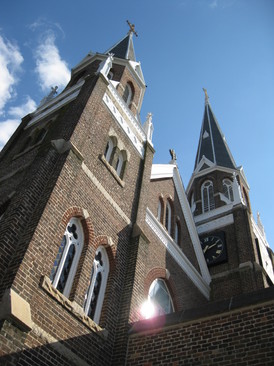 In 1892 Abbot-Bishop Leo Michael Haid blessed and laid the cornerstone for the abbey church which in time became the cathedral for the Apostolic Vicariate (founded in 1910). This church had two significant uses: it was the church in which the monks daily prayed and it was the heart of Catholic life for the state of
In 1892 Abbot-Bishop Leo Michael Haid blessed and laid the cornerstone for the abbey church which in time became the cathedral for the Apostolic Vicariate (founded in 1910). This church had two significant uses: it was the church in which the monks daily prayed and it was the heart of Catholic life for the state of
The church building is a sign and reminder of the immanence and transcendence of God --who chose to dwell among us and whose presence cannot be contained or limited to any single place. ...Churches are signs of the pilgrim church on earth; they are images that proclaim the heavenly
The dedication of a church, especially a cathedral, is a significant and rare event in the life of a Christian community. It involves more than merely setting aside a building for the celebration of sacred things, since the people who plan, build, and dedicate a sacred
place are themselves the Church, "that is, the
in the Eucharist." (Rite for the Dedication of a Church and an Altar, chapter 2, no. 1)
This building is both the house of God on earth (domus Dei) and a house fit for
the prayers of the saints (domus ecclesiae). (Built of Living Stones, no. 16)
O how amiable are thy dwellings: thou Lord of hosts!
My soul hath a desire and a longing to enter into the courts of the Lord:
My heart and my flesh rejoice in the living God.
Yea, the sparrow hath found her a house,
and the swallow a nest where she may lay her young:
even the altars, O Lord of hosts, my King and my God.
Blessed are they that dwell in thy house: they will be always praising thee.
The glorious Majesty of the Lord our God be upon us:
prosper thou the work of our hands upon us.
O prosper thou our handywork, O prosper thou our handywork.
O God our help in ages past, Our hope for years to come,
Our shelter from the stormy blast, And our eternal home.
(Text Psalms 84 & 90; Isaac Watts (1674-1748))
An Oblate of Saint Benedict is a Christian individual (lay people and diocesan priests) who is associated with a particular
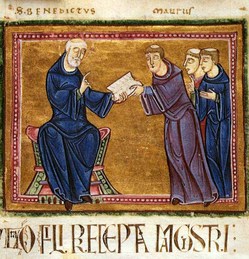 Benedictine monastery, usually one that is close to where one lives, in order to enrich his or her Christian way of life. An Oblate forms and sustains a spiritual bond with the monastery where the oblation is made. So, the hope is that those making an oblation actually share in a spiritual union that is based in friendship with a particular monastic community. Bonded in prayer, love and commitment, Oblates are partners in the prayer and works of the monastery and with the professed monks, nuns and oblates search for God together with the goal of arriving at our destiny: the Beatific Vision, God.
Benedictine monastery, usually one that is close to where one lives, in order to enrich his or her Christian way of life. An Oblate forms and sustains a spiritual bond with the monastery where the oblation is made. So, the hope is that those making an oblation actually share in a spiritual union that is based in friendship with a particular monastic community. Bonded in prayer, love and commitment, Oblates are partners in the prayer and works of the monastery and with the professed monks, nuns and oblates search for God together with the goal of arriving at our destiny: the Beatific Vision, God.
Oblates are most often Catholics, but practicing members of the Christian ecclesial communities are also welcome to be Oblates. But for Catholic Oblates, there is a crucial connection between the Holy Eucharist and sacred Scripture, devotion to the Blessed Virgin Mary and faithfulness to the Church teaching. The hope is that an Oblate conforms his or her life according the Gospel, the Rule of Saint Benedict and the constitutions (customs) of a particular family of monks or nuns, e.g., the American-Cassinese Congregation, the Swiss-American Congregation or the English Benedictine Congregation or whatever monastic family in which you make your oblation. An example could be that as monks take a new name upon entering the monastic life so too do some Oblates take on an "oblate name" signalling a change of heart and mind. This name is not for legal use, mind you.
Some simple duties of a Benedictine Oblate are:
-daily praying of Lauds and Vespers (doing the other Hours are encouraged)
-daily Lectio Divina
-daily reading of a chapter of the Rule of Saint Benedict (no more than 3-4 paragraphs)
-frequent reception of the sacraments of Holy Communion and Confession
-keep some portion of the day in silence as possible
-be committed to ongoing spiritual, intellectual and human formation
-if possible, see a spiritual director
-keep an awareness of the Trinitarian life in front of you, that in all things God may be glorified
-keep the bond of friendship with the monastery of oblation as possible
-and perhaps doing some charitable work as possible.
As a Christian the Oblate seeks God by striving to become a saint in his or her daily life; this is accomplished by integrating a life of prayer and work because they manifest Christ's presence to society.
Available websites:
General Information on Benedictine Oblates
International Benedictine Oblates
The Oblate Forum
The Oblate Newsletter from
The Oblate Newsletter from
A good example of Oblate Statutes comes from the Monastery of Jesus Crucified (Branford, CT). The former chaplain wrote the statutes with the sisters.
Saint Benedict and Saint Scholastica, pray for us!
Saint Maurus and Saint Placid, pray for us!
Saint Henry and Saint Frances of Rome, pray for us!
Prime Minister Gordon Brown is supporting a change in law that would open the door to Catholics being a monarch. But this may also open the door to a Muslim or a Hindu being a King or Queen of England. Interesting. Read about it. But there's criticism, too.
Sometimes I get weary about blogging because of the time it takes and some days it seems so boring. So I ask questions like: is it useful, for whom am I writing, for what reason, is this just an ego-trip, etc. I came across a few lines of Pope John Paul II which gives me slight encouragement. He said:
A priest in
The real matter is the process of justice.
Father Manship, like any priest, like any Catholic, was right to stand up for the rights of people against the injustice. The Gospel calls us to this type of witness. Prudence and discretion are also required. The Ecuadorean couple may well have been doing wrong but following Catholic Social Teaching and just laws to right the matter is required.
The head of the African Jesuit AIDS Network (AJAN) Jesuit Father Michael Czerny reflects on the Pope's comments on condoms in an online article, "A human and spiritual wake-up call." The author deals with what the Pope actually said, not what the what media heard. Father Czerny does a good job with the matter.
 The US Bishops' Committee on Doctrine approved on March 24th and released on the 25th the Guidelines for Evaluating Reiki as an Alternative Therapy. Read the Guidelines for yourself. I suppose this important stuff; I usually look for liturgical heterodoxy and various heretical teachings first...but the bishops have a point. Since I am not a life force, universal or otherwise, I'll throw away my Reiki books.
The US Bishops' Committee on Doctrine approved on March 24th and released on the 25th the Guidelines for Evaluating Reiki as an Alternative Therapy. Read the Guidelines for yourself. I suppose this important stuff; I usually look for liturgical heterodoxy and various heretical teachings first...but the bishops have a point. Since I am not a life force, universal or otherwise, I'll throw away my Reiki books.
I am the Great Sun
(from a
I am the great sun, but you do not see me,
I am your husband, but you turn away.
I am the captive, but you do not free me,
I am the captain you will not obey.
I am the truth, but you will not believe me,
I am the city where you will not stay.
I am your wife, your child, but you will leave me,
I am that God to whom you will not pray.
I am your counsel, but you do not hear me,
I am the lover whom you will betray.
I am the victor, but you will not cheer me,
I am the holy dove whom you will slay.
I am your life, but you will not name me,
Seal up your soul with tears, and never blame me.
Charles Causely
 Charles Causley was born and has lived, apart from six years in the Royal Navy during the Second World War, in Launceston,
Charles Causley was born and has lived, apart from six years in the Royal Navy during the Second World War, in Launceston,
A recent interview with His Excellency, Archbishop Raymond Leo Burke, Prefect of the Apostolic Signatura (The Pope's Chief Justice) regarding the application of Canon 915 is online here. Nothing new is presented but he states the truth of Catholic teaching.
Canon 915 of the 1983 Code of Canon Law reads: "Those who have been excommunicated or interdicted after the imposition or declaration of the penalty and others obstinately persevering in manifest grave sin are not to be admitted to holy communion."
I think he's clear on the thinking of the Church on its application, don't you? Is there debate?
Hail, Mary, full of grace. The is with thee.
Hail, thou star of ocean!
Portal of the sky!
Ever Virgin Mother
Of the Lord most high!
Oh, by Gabriel's Ave,
Eva's name reversing,
'Stablish peace below.
Break the captive's fetters;
Light on blindness pour;
All our ills expelling,
Every bliss implore.
Show thyself a mother;
Offer Him our sighs,
Who for us incarnate
Did not thee despise.
Virgin of all virgins!
To thy shelter take us;
Gentlest of the gentle!
Chaste and gentle make us.
Still as on we journey,
Help our weak endeavor;
Till with thee and Jesus
We rejoice for ever.
Through the highest heaven,
To the Almighty Three,
Father, Son, and Spirit,
One same glory be. Amen.
At his general audience on march 24, 2004, Pope John Paul II said the following about today's feast of the Annunciation of the Lord:
This feast, which this year falls in the middle of Lent, on one hand refers us to the beginnings of salvation, and on the other invites us to turn our gaze to the paschal mystery. We look at Christ crucified who has redeemed humanity, fulfilling to the end the will of the Father. On
Associated to the mystery of the Incarnation, Our Lady is co-participant in the mystery of redemption. Her fiat, which we recall tomorrow, echoes that of the incarnate Word. In profound symphony with Christ's and the Virgin's fiat, each one of us is called to unite his own "yes" to the mysterious plans of
This novena is prayed each day from the Solemnity of the Annunciation to
the Solemnity of the Nativity of the Lord, March 25 - December 25
Salve
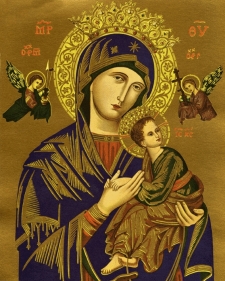 O Virgin of the Incarnation, a thousand times we praise thee, a thousand times we greet thee, for the joy thou did know when the Son of God became flesh in thy womb. Because thou are most powerful, O Virgin Mother of God, grant what we beseech thee for the love of God: (here name the three intentions).
O Virgin of the Incarnation, a thousand times we praise thee, a thousand times we greet thee, for the joy thou did know when the Son of God became flesh in thy womb. Because thou are most powerful, O Virgin Mother of God, grant what we beseech thee for the love of God: (here name the three intentions).
Memorare (Remember, O most gracious Virgin Mary...)
Hail Mary
May the heart of Jesus in the Most Blessed Sacrament, be praised, adored and loved with grateful affection at every moment in all the tabernacles of the world and in the hearts of all, even until the end of time. Amen.
From a letter by Saint Leo the Great
Lowliness is assumed by majesty, weakness by power, mortality by eternity. To pay the debt of our sinful state, a nature that is incapable of suffering was joined to one that could suffer. Thus, in keeping with the healing that we needed, one and the same mediator between God and men, the man Jesus Christ, was able to die in one nature, and unable to die in the other.
 He who is true God was therefore born in the complete and perfect nature of a true man, whole in his own nature, whole in ours. By our nature we mean what the Creator had fashioned in us from the beginning, and took to himself in order to restore it. For in the Savior there was no trace of what the deceiver introduced and man, being misled, allowed to enter. It does not follow that because he submitted to sharing in our human weakness he therefore shared in our sins. He took the nature of a servant without stain of sin, enlarging our humanity without diminishing his divinity. He emptied himself; though invisible he made himself visible, though Creator and Lord of all things he chose to be one of us mortal men. Yet this was the condescension of compassion, not the loss of omnipotence. So he who in the nature of God had created man, became in the nature of a servant, man himself.
He who is true God was therefore born in the complete and perfect nature of a true man, whole in his own nature, whole in ours. By our nature we mean what the Creator had fashioned in us from the beginning, and took to himself in order to restore it. For in the Savior there was no trace of what the deceiver introduced and man, being misled, allowed to enter. It does not follow that because he submitted to sharing in our human weakness he therefore shared in our sins. He took the nature of a servant without stain of sin, enlarging our humanity without diminishing his divinity. He emptied himself; though invisible he made himself visible, though Creator and Lord of all things he chose to be one of us mortal men. Yet this was the condescension of compassion, not the loss of omnipotence. So he who in the nature of God had created man, became in the nature of a servant, man himself.
Thus the Son of God enters this lowly world. He comes down from the throne of heaven, yet does not separate himself from the Father's glory. He is born in a new condition, by a new birth. He was born in a new condition, for, invisible in his own nature, he became visible in ours. Beyond our grasp, he chose to come within our grasp. Existing before time began, he began to exist at a moment in time. Lord of the universe, he hid his infinite glory and took the nature of a servant. Incapable of suffering as God, he did not refuse to be man, capable of suffering. Immortal, he chose to be subject to the laws of death. He who is true God is also true man. There is not falsehood in this unity as long as the lowliness of man and the preeminence of God coexist in mutual relationship.
As God does not change by his condescension, so man is not swallowed up by being exalted. Each nature exercises its own activity, in communion with the other. The Word does what is proper to the Word, the flesh fulfills what is proper to the flesh. One nature is resplendent with miracles, the other falls victim to injuries. As the Word does not lose equality with the Father's glory, so the flesh does not leave behind the nature of our race.
One and the same person -this must be said over and over again--is truly the Son of God and truly the son of man. He is God in virtue of the fact that "in the beginning was the Word, and the Word was with God, and the Word was God." He is man in virtue of the fact that "the Word was made flesh, and dwells among us."
Well, I have some questions: Whose justice is being sought and what are the principles for fairness? Tell me exactly for whom justice is being sought NOW for victims of sex abuse? Show me where the reasonableness of the proposed bill to extend the statute of limitations is? NY State Assemblywoman Margaret M. Markey (her area of concern is
Even the civil liberties groups and Jewish congregations are against the Markey bill.
As Margaret Markey explains the justification of the bill:
Sex crimes, particularly those committed against children, are among the most heinous and deeply disturbing in our society. They are crimes that leave life-long scars, multiple victims and require an all encompassing strategy to combat. This proposal would extend the authority to prosecute and to bring a civil lawsuit for damages in child sexual abuse cases in three significant ways, regardless of whether or not DNA evidence is available. This bill will provide a remedy for those whose lives have been unalterably changed by the horror of childhood sexual abuse. Victims of these horrific crimes will get their day in court and be able to seek the justice they have been denied.
I think reasonable people would agree with the first two sentences. No one would say otherwise. The rest is silly, if not plain irrational, unlawful and bigoted. Who would agree to being tried for a crime of embezzlement without proof that money was first present and then stolen? Plus, credible evidence based on someone's memory says that memory is unreliable, period. People tested for memory recall have failed expert tests trying to prove there is infallible. A 60 Minutes article demonstrated this fact a few weeks ago. Hence, if all you have to go on is one's memory of a supposed event 30 years ago then it seems hardly possible that a conviction will be justifiably given. From what's presented you get the sense the Markey bill is less about justice than retribution.
That this bill could jeopardize the ministries of the Catholic Church in NY and other religious and civil groups is a serious matter to understand. It may very well force the closings of parishes, schools and other social services. Taht said, the Church being poorer may not be a bad thing because it is not built on money, fame and power but on the Lord. We all have to ask ourselves is willing the good of another actually being sought in this bill? Don't get me wrong, money pays the bills and yet it has no intrinsic value and it won't get you into heaven. I see no reason to stake the bill's overturn on the premise that it will bankrupt the Church so I would rather see the bill's overturn based on solid principles of Catholic Social Teaching and good theology first. The Church is not concerned with money for the sake of acquiring money; any assets the Church possesses is used for the proclamation of the Gospel and serving the common good. Certainly seek justice within the framework of principle not sentiment.
Read the NY Times article on the subject and a recent article in the National Catholic Register on the matter.
As Christ came into the world, he said: Behold! I have come to do your will, O God.
(Entrance Antiphon)
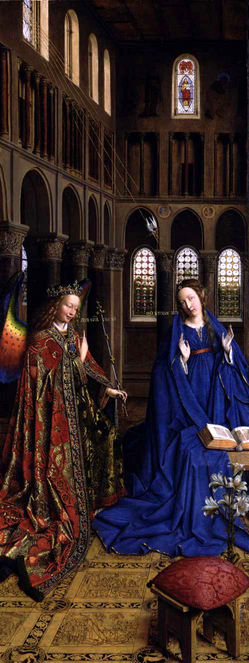 O glorious lady, throned in rest,
O glorious lady, throned in rest,
Amidst the starry host above,
Who gavest nurture from thy breast
To God, with pure maternal love.
What we had lost through sinful Eve
The Blossom sprung from thee restores,
And, granting bliss to souls that grieve,
Unbars the everlasting doors.
O Gate, through which hath passed
the King,
O Hall, whence Light shone through the gloom;
The ransomed nations praise and sing
Life given from the Virgin womb.
All honor, praise, and glory be,
O Jesus, Virgin-born to Thee;
All glory, as is ever meet,
To Father, and to Paraclete. Amen.
The Annunciation to Mary inaugurates 'the fullness of time,' the time of the fulfillment of God's promises and preparations. Mary was invited to conceive him in whom the 'whole fullness of deity' would dwell 'bodily.' The divine response to her question, "How can this be, since I know not man?' was given by the power of the Spirit: 'The Holy Spirit will come upon you.' (CCC 484)
John Allen reflects on the Pope's time in
National Catholic Reporter, 2009
I don't think I've ever covered a papal trip where the gap between internal and external perceptions has been as vast as over these three days. It's almost as if the pope has made two separate visits to
In the
Vast and pumped-up crowds flocked to see the pope, and Benedict seemed swept up in the enthusiasm. Twice he referred to Africa as the "continent of hope," and at one point, this consummate theologian even mused aloud about a new burst of intellectual energy in Africa that might generate a 21st century version of the famed school of Alexandria, which gave the early church such luminaries as Clement and Origen.
As counter-intuitive as it may seem to Westerners, it was difficult to find anyone in
Bottom line: Seen from abroad, the trip has been about condoms; on the ground, it's felt like a celebration of African Catholicism. Here's a surreal experience that underscores the disjunction.
On Tuesday, I prepared a piece on the pope's indirect, but unmistakable, rebuke of
Benedict didn't want to embarrass his host, but he also didn't want the photo-op to imply a papal seal of approval. Thus, without mentioning Biya directly, Benedict said pointedly that Christians must speak out against "corruption and abuses of power." That was enough to set off shockwaves in
I was outlining all this in my article when I had to break off to do an interview with CNN International about day one of the trip ... which was entirely devoted to the condoms controversy. To be honest, I had to wonder if we were even talking about the same event.
That said, let me be clear: This perception gap is not exclusively, or even primarily, the media's fault. The reporter from French TV who asked Benedict the condom question aboard the papal plane was well within bounds; AIDS is serious business, and it's fair game to ask the pope about it on his first visit to the continent that's been hardest hit by the disease. Once the question was popped, the ball was in Benedict's court. Much of the blame for what happened next, therefore, has to lie at his feet.
By that, I'm not taking any position on the substance of the pope's answer, though in fairness he did no more than repeat church teaching on contraception, as well as the nearly unanimous view of every African bishop I've ever interviewed: that condoms give their people a false sense of invulnerability, thereby encouraging risky sexual behavior. That may be debatable, but one can hardly fault the pope for taking his cues from the bishops on the ground. (Ironically, popes usually get in trouble precisely for not listening to local bishops.)
Setting aside what he said, there's still the matter of whether this was the right time and place to say it - especially since it would inevitably overshadow the message Benedict was flying to
Anybody who's ever spent time in front of cameras knows how to dance around a question that's not going to lead anywhere good. Benedict could have said something like: "Of course the church is deeply concerned about AIDS, which is why a quarter of all AIDS patients in the world are cared for by Catholic hospitals and other facilities. As far as condoms are concerned, our teaching is well-known, but today isn't the right time for discussing it. Instead, I want to focus on my message of hope to the African people," etc., etc. The story that probably would have resulted - "Benedict shrugs off condoms query" - would hardly have generated a global uproar.
Someone hungry for a silver lining might be tempted to say that the sideshow on condoms made the world pay attention to the
Yet however one assigns the blame, the fact remains that international discussion of Benedict in
AFRICA/AIDS "wars" distorted by libertarians
John Waters
The Irish Times, 2009
DRIVING AROUND
In the 1980s,
No sooner had Pope Benedict XVI stepped off the aircraft in
Spokesmen and women for European governments claimed the use of condoms was the vital element in the fight against Aids. We were told that "even" some priests and nuns working against Aids believe the pope is wrong.
But for every such voice, there are hundreds of priests, nuns and other anti-Aids activists in
At the core of the kick-the- pope argument is a gross absurdity. Aids was spread in
The pope, as well as opposing condoms, is also hostile to prostitution and extra-marital sex, and yet it is implied that those who have been spreading HIV/Aids through promiscuous behaviour would wear condoms if the pope told them to do so. But Pope Benedict is neither a lawmaker nor a policeman. He has the power simply to speak the truth as he has received it and then allow everyone the freedom to decide for themselves.
Whether the libertarian West likes it or not, much of the evidence in
In the 25 years since Aids was first reported in
State-sponsored programmes reduced Aids prevalence from over 30 per cent to about 6 per cent. Fidelity to a single partner was the dominant message of early HIV prevention campaigns.
In recent years, there has been a slight disimprovement in
Ideally, one might think, abstinence programmes and safe sex strategies should complement each other. But in practice the approaches are mutually incompatible. Once you advocate condom use, you are accepting that abstinence is no longer a persuasive option. And if you argue, as the Catholic Church does, that promiscuity promotes HIV/Aids, it would be ludicrous to recommend measures that, implicitly, suggest that this position can be relativised.
This is a complex issue, which certainly cannot be reduced to a simple questions of condoms. What the world needs is a full and truthful discussion, not bigoted, libertarian propaganda masquerading as reportage.
James Cardinal Gibbons
Archbishop of
Cardinal Priest of
20 May 1877, archbishop of
Of the many things the Cardinal is known for is the arranging for the possession by the Benedictines of Caldwell Place in Gaston County, North Carolina, on which Mary, Help of Christians - Belmont Abbey sits. He also ordained Abbot Leo Michael Haid, a bishop and arranged for him to be the vicar apostolic of North Carolina. Haid prayed one of the absolutions for the Cardinal at his funeral. The monks of Belmont Abbey remembered the Cardinal at Mass today.
In a letter of greeting to Cardinal Renato Raffaele Martino the Pope on the occasion of the "Life, Family, Development: The Role of Women in the Promotion of Human Rights," conference which took place week in the Vatican he wrote of that Christianity is life giving, and not full of despair in front of reality and that following John Paul insight, there is a new feminism informed by the Gospel that has the power to change people.
I am pleased to extend cordial greetings to you and to all those taking part in the International Conference on the theme "Life, Family and Development: the Role of Women in the Promotion of Human Rights." This event, sponsored by the Pontifical Council for Justice and Peace, with the cooperation of the World Women's Alliance for Life and Family, the World Union of Catholic Women's Organizations and other associations, is an exemplary response to my predecessor Pope John Paul II's call for a "new feminism" with the power to transform culture, imbuing it with a decisive respect for life (cf. Evangelium Vitae, 98-99).
Every day we learn of further ways in which life is compromised, particularly in its most vulnerable stages. While justice demands that these be decried as a violation of human rights, they must also evoke a positive and proactive response. The recognition and appreciation of God's plan for women in the transmission of life and the nurturing of children is a constructive step in this direction. Beyond this, and given the distinctive influence of women in society, they must be encouraged to embrace the opportunity to uphold the dignity of life through their involvement in education and their participation in political and civic life. Indeed, because they have been gifted by the Creator with a unique "capacity for the other," women have a crucial part to play in the promotion of human rights, for without their voice the social fabric of society would be weakened (cf. Letter to the Bishops of the Catholic Church on the Collaboration of Men and Women in the Church and in the World, Congregation for the Doctrine of the Faith, 13). As you reflect on the role of women in the promotion of human rights, I invite you to keep in mind a task to which I have drawn attention on several occasions: namely, to correct any misconception that Christianity is simply a collection of commandments and prohibitions. The Gospel is a message of joy which encourages men and women to delight in spousal love; far from stifling it, Christian faith and ethics make it healthy, strong and truly free. This is the exact meaning of the Ten Commandments: they are not a series of "noes" but a great "yes" to love and to life (cf. Address to the Participants at the Ecclesial Convention of the Diocese of Rome,
It is my sincere hope that your discussions over these next two days will translate into concrete initiatives that safeguard the indispensable role of the family in the integral development of the human person and of society as a whole. The genius of women to mobilize and organize endows them with the skills and motivation to develop ever-expanding networks for sharing experiences and generating new ideas. The accomplishments of WWALF and the UMOFC/WUCWO are an outstanding example of this, and I encourage their members to persevere in their generous service to society. May the sphere of your influence continue to grow at regional, national and international levels for the advancement of human rights based on the strong foundation of marriage and family.
I once more extend best wishes for the success of this conference and my prayers for the continuing mission of the participating organizations. Invoking the intercession of Mary, "the symbol and the most perfect realization of the Church" (Catechism of the Catholic Church, 570), I cordially impart my Apostolic Blessing.
BENEDICTUS PP. XVI
The Synod of Bishops for
at the
The Church in
justice and peace
You are the salt of the earth...You are the light of the world
(Matthew 5:13,14)
The Instrumentum Laboris (2009) (a working document for the synod)
The Lineamenta (2006) (sets priorities)
The Post-Synodal Apostolic Exhortation Ecclesia in Africa (1995)
of the Church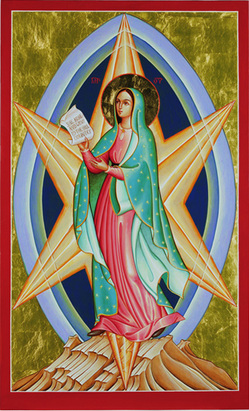 O Mary, Mother of God
O Mary, Mother of God
and Mother of the Church,
thanks to you, on the day of the Annunciation,
at the dawn of the new era,
the whole human race with its cultures
rejoiced in recognizing itself
ready for the Gospel.
On the eve of a new Pentecost
for the Church in Africa, Madagascar
and the adjacent Islands,
the People of God with its Pastors
turns to you and with you fervently prays:
May the outpouring of the Holy Spirit
make of the cultures of Africa
places of communion in diversity,
fashioning the peoples of this great Continent
into generous sons and daughters
which is the Family of the Father,
the Brotherhood of the Son,
the Image of the Trinity,
the seed and beginning on earth of the eternal Kingdom
which will come to its perfection
in the City that has God as its Builder:
the City of justice, love and peace.
In case you're hearing noises from THE piazza, or just from your computer's speakers, you should know that the ever effervescent Father Guy Selvester has resumed his blog, Shouts in the Piazza. He took the last few months off from blogging.
He brings wit and wisdom to the often dowdy blogosphere. You will see on Shouts in the Piazza a lot about ecclesiastical heraldry, some stuff about Church life in general, his own thoughts, homilies, etc.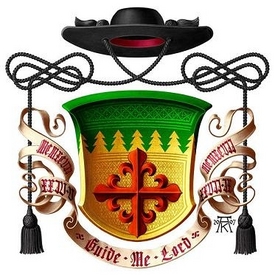 Father Selvester is a parish priest of the Diocese of Metuchen in
Father Selvester is a parish priest of the Diocese of Metuchen in
Some points of interest from the Pope's Laetare Sunday homily:
 When God's word -- a word meant to build up individuals, communities and the whole human family -- is neglected, and when God's law is "ridiculed, despised, laughed at" (ibid., v. 16), the result can only be destruction and injustice: the abasement of our common humanity and the betrayal of our vocation to be sons and daughters of a merciful Father, brothers and sisters of his beloved Son.
When God's word -- a word meant to build up individuals, communities and the whole human family -- is neglected, and when God's law is "ridiculed, despised, laughed at" (ibid., v. 16), the result can only be destruction and injustice: the abasement of our common humanity and the betrayal of our vocation to be sons and daughters of a merciful Father, brothers and sisters of his beloved Son.
God dwells, we know, in the hearts of all who put their faith in Christ, who are reborn in Baptism and are made temples of the Holy Spirit. Even now, in the unity of the Body of Christ which is the Church, God is calling us to acknowledge the power of his presence within us, to re-appropriate the gift of his love and forgiveness, and to become messengers of that merciful love within our families and communities, at school and in the workplace, in every sector of social and political life.
I ask you today, in union with all our brothers and sisters throughout Africa, to pray for this intention: that every Christian on this great continent will experience the healing touch of God's merciful love, and that the Church in Africa will become "for all, through the witness borne by its sons and daughters, a place of true reconciliation" (Ecclesia in Africa, 79).
You have received power from the Holy Spirit to be the builders of a better tomorrow for your beloved country. In Baptism you were given the Spirit in order to be heralds of God's Kingdom of truth and life, of holiness and grace, of justice, love and peace (cf. Roman Missal, Preface of Christ the King). On the day of your Baptism you received the light of Christ. Be faithful to that gift! Be confident that the Gospel can affirm, purify and ennoble the profound human values present in your native culture and traditions: your strong families, your deep religious sense, your joyful celebration of the gift of life, your appreciation of the wisdom of the elderly and the aspirations of the young. Be grateful, then, for the light of Christ! Be grateful for those who brought it, the generations of missionaries who contributed -- and continue to contribute -- so much to this country's human and spiritual development. Be grateful for the witness of so many Christian parents, teachers, catechists, priests and religious, who made personal sacrifices in order to pass this precious treasure down to you! And take up the challenge which this great legacy sets before you. Realize that the Church, in
How much darkness there is in so many parts of our world! Tragically, the clouds of evil have also overshadowed
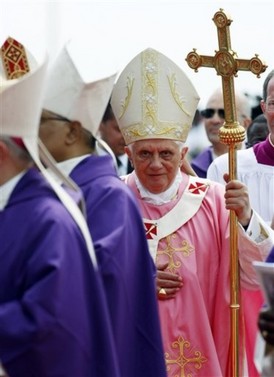 Even if it means being a "sign of contradiction" (Lk 2:34) in the face of hardened attitudes and a mentality that sees others as a means to be used, rather than as brothers and sisters to be loved, cherished and helped along the path of freedom, life and hope.
Even if it means being a "sign of contradiction" (Lk 2:34) in the face of hardened attitudes and a mentality that sees others as a means to be used, rather than as brothers and sisters to be loved, cherished and helped along the path of freedom, life and hope.
Dear young friends: you are the hope of your country's future, the promise of a better tomorrow! Begin today to grow in your friendship with Jesus, who is "the way, and the truth and the life" (Jn 14:6): a friendship nurtured and deepened by humble and persevering prayer. Seek his will for you by listening to his word daily, and by allowing his law to shape your lives and your relationships. In this way you will become wise and generous prophets of God's saving love. Become evangelizers of your own peers, leading them by your own example to an appreciation of the beauty and truth of the Gospel, and the hope of a future shaped by the values of God's Kingdom. The Church needs your witness! Do not be afraid to respond generously to God's call, whether it be to serve him as a priest or a religious, as a Christian parent, or in the many forms of service to others which the Church sets before you.
Pope Benedict XVI
Laetare Sunday Mass
Here are three paragraphs that I find particularly important in what the Pope said about the plight of women and our responsibilities according to the Divine Plan. The Pope reflects to us not only the problems women face in other nations but it should be taken to heart even in first world nations like the
I call everyone to an effective awareness of the adverse conditions to which many women have been -- and continue to be -- subjected, paying particular attention to ways in which the behavior and attitudes of men, who at times show a lack of sensitivity and responsibility, may be to blame. This forms no part of God's plan. In the Scripture reading, we heard that the entire people cried out together: "all that the Lord has spoken, we will do!" Sacred Scripture tells us that the divine Creator, looking upon all he had made, saw that something was missing: everything would have been fine if man had not been alone! How could one man by himself constitute the image and likeness of God who is one and three, God who is communion? "It is not good that the man should be alone; I will make him a helper fit for him" (Gen
As you know, my dear friends, this order of love belongs to the intimate life of God himself, the Trinitarian life, the Holy Spirit being the personal hypostasis of love. As my predecessor Pope John Paul II once wrote, "in God's eternal plan, woman is the one in whom the order of love in the created world of persons takes first root" (Mulieris Dignitatem, 29). In fact, gazing upon the captivating charm that radiates from woman due to the inner grace God has given her, the heart of man is enlightened and he sees himself reflected in her: "This at last is bone of my bones and flesh of my flesh" (Gen 2:23). Woman is another "I" who shares in the same human nature. We must therefore recognize, affirm and defend the equal dignity of man and woman: they are both persons, utterly unique among all the living beings found in the world.
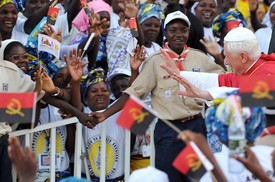 Man and woman are both called to live in profound communion through a reciprocal recognition of one another and the mutual gift of themselves, working together for the common good through the complementary aspects of masculinity and femininity. Who today can fail to recognize the need to make more room for the "reasons of the heart"? In a world like ours, dominated by technology, we feel the need for this feminine complementarity, so that the human race can live in the world without completely losing its humanity. Think of all the places afflicted by great poverty or devastated by war, and of all the tragic situations resulting from migrations, forced or otherwise. It is almost always women who manage to preserve human dignity, to defend the family and to protect cultural and religious values.
Man and woman are both called to live in profound communion through a reciprocal recognition of one another and the mutual gift of themselves, working together for the common good through the complementary aspects of masculinity and femininity. Who today can fail to recognize the need to make more room for the "reasons of the heart"? In a world like ours, dominated by technology, we feel the need for this feminine complementarity, so that the human race can live in the world without completely losing its humanity. Think of all the places afflicted by great poverty or devastated by war, and of all the tragic situations resulting from migrations, forced or otherwise. It is almost always women who manage to preserve human dignity, to defend the family and to protect cultural and religious values.
Pope Benedict XVI to the Catholic Movements for the Promotion of Women
Presents
Solzhenitsyn
A life with no lies
A homage to his life, works and relentless love for freedom
Speakers
Prof. Adriano Dell'ASTA
Professor of Russian Language & Literature, Catholic University of
Ms. Liudmila SARASKINA
Russian Literature Historian and Personal Collaborator of Solzhenitsyn
A video of one of Solzhenitsyn's last interviews will be shown for the first time in the
The conference is open to the public and free of charge.
For more information, visit our web site: www.crossroadsculturalcenter.org or
E-mail: info@crossroadsnyc.com
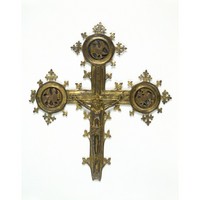 In the Bible the cross is the expression of a life that is completely being for others. It is not man who goes to God with a compensatory gift, but God who comes to man, in order to give to him. He restores disturbed right on the initiative of his own power to love, by making unjust man just again, the dead living again, through his own creative mercy.
In the Bible the cross is the expression of a life that is completely being for others. It is not man who goes to God with a compensatory gift, but God who comes to man, in order to give to him. He restores disturbed right on the initiative of his own power to love, by making unjust man just again, the dead living again, through his own creative mercy.
In the New Testament the cross appears primarily as a movement from above to below. It does not stand there as the work of expiation which mankind offers to the wrathful God, but as the expression of that foolish love of God's which gives itself away to the point of humiliation in order thus to save man; it is his approach to us, not the other way about.
Benedictus
Pope Benedict XVI
A question of what is the difference between the March and July observances of the feast of Saint Benedict.
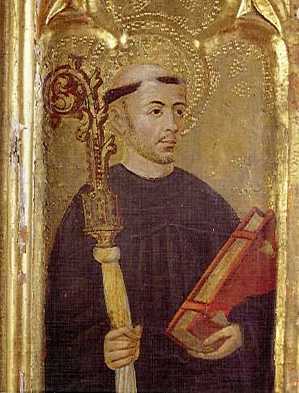 The July feast was the one celebrated in
The July feast was the one celebrated in
The Church, however, certainly never rejected the July 11 feast, as the celebration of the translation of the bones is really not about Fleury-vs.-Monte
March 21 is the feast of Saint Benedict's death. It more specifically concerns his entry into heaven and his role as Father of Western Monasticism.
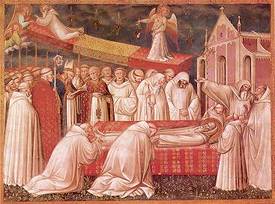 Let the whole multitude of the faithful exult in the glory of our beloved Father Benedict; but most of all let that army of monks be glad who on earth are celebrating the feast of him with whom the Saints in heaven are rejoicing. (Magnificat antiphon)
Let the whole multitude of the faithful exult in the glory of our beloved Father Benedict; but most of all let that army of monks be glad who on earth are celebrating the feast of him with whom the Saints in heaven are rejoicing. (Magnificat antiphon)
Today was a glorious day. The weather was particularly beautiful and the grounds of the Abbey and College were manicured on Friday plus the flowering trees are bursting forth with color. Our many guests attested to value of the charism of Saint Benedict and the witness of the monastic community here in the Charlotte metro area. We can say that the monks and friends are intertwined in a very real way.
The 4th bishop of the Diocese of Charlotte, the Most Reverend Peter J. Jugis, JCD, presided his choir robes and many priests of the diocese concelebrated the Mass with Father Abbot Placid, celebrating. All of the monks and guests staying at the abbey were present. It was particularly fitting to have some of the priests of the diocese who in some way collaborate with the abbey here because of the strong connection that exists between the abbey and the diocese: the abbey was the seat of the diocese and the monks either founded and staffed some of the parishes or provided weekend assistance. Heartwarming for me was the clear sense of fraternal love and unity with Saint Peter in the Episcopal office with the presence of Bishop Jugis because there are monasteries live in friction with the local bishop and by extension the Holy Father. Hence it was evident to me that there's been a genuine affection between the bishop and the monks. I'd be remiss if I didn't mention the presence of the Religious Sisters of Mercy. They've held a close relationship with the monks of this abbey since the 19th century and the monks continue to be their chaplains down to today.
As an historical note, the Holy See erected the Diocese of Charlotte on
In the homily Father Abbot spoke of Saint Benedict personally hearing the voice of Christ calling him to follow. As Benedict listened with the ear of his heart, so we should listen to the call of the Master (Christ). We know that through baptism we are reborn as adopted children of God and our lived experience tells us that we are being formed into saints, or at least the hope is that we'd become saints. Being a saint, however, is not being a plastic sort of character but a person who really lives what his conviction in Christ is. It's the saint that lets know that God is real and that His love and creative power endures; it's the saint that knows and shows us that the divine promise is a fact. Two aspects of this the divine promise bear mentioning because they are constituent parts of Benedict's life: forgiveness (mercy) and providence (life will be set right). In forgiveness our sins are forgiven and we are given the grace to transform our lives from ugliness to beauty.
The abbot also noted for us that Benedict is an example of being "watchful" in the face of grace and sin; he was attentive to sustaining others in the struggle against Satan. One can say, therefore, that Benedict is a living Gospel: he lived the Gospel faithfully and his witness to Christ was substantial. While it seems odd that on a joyous occasion such as this feast to tell people to keep death before our eyes as Benedict admonished his monks, it is nevertheless true that we ought to do so because it is an expression of Christian hope: we desire our destiny, we desire the infinite. As Pope Benedict reminded us in last encyclical, the distinguishing mark of the Christian is that we know we have a future. Just as Saint Benedict was converted, the abbot said, by the Paschal Mystery of the Lord, so by that same Mystery shall we be transformed if we give ourselves over the Lord without reserve.
One may note in the Ordo for liturgical services that March 21 is a liturgical memorial of Saint Benedict, co-patron of
By the use of the word "solemnity" I mean the use of festive hymns and antiphons for the saint or the Lord are sung, incense and white vestments are used, and the Gloria is sung and the Creed recited at
For the monks of Belmont solemnities never end: the anniversary of the Dedication of the Abbey Church falls on March 28 but that day, even though it is a solemn occasion, will be simplified I can assure you. All these special celebrations can obscure the sober liturgical sense that's supposed to be followed for Lent and yet there is a particular Catholic sense of the Incarnation that's manifested when we properly observe feasts on their proper days. Given that Mary, Help of Christians -
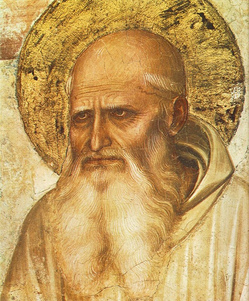 At the solemn Vespers last eve, the Father Abbot was suitably decorated in mitre with crosier, symbols of his office as a head of the abbey. A special vesperal hymn for the Transitus of Benedict, "Whate'er of Yore," was sung. According to Father Prior this hymn is of unknown provenance and yet highly revered. It speaks of the prophets and the Law, Abraham and Moses, perfect virtue, especially asceticism, obedience and peace viz. the witness of blessed Benedict amidst the storms of era. The lyrics bear our attention:
At the solemn Vespers last eve, the Father Abbot was suitably decorated in mitre with crosier, symbols of his office as a head of the abbey. A special vesperal hymn for the Transitus of Benedict, "Whate'er of Yore," was sung. According to Father Prior this hymn is of unknown provenance and yet highly revered. It speaks of the prophets and the Law, Abraham and Moses, perfect virtue, especially asceticism, obedience and peace viz. the witness of blessed Benedict amidst the storms of era. The lyrics bear our attention:
Whate'ver of yore the tuneful prophets teach
Or Law of olden days,
Great monarch of ascetic multitudes,
Thy life displays.
A glorious progeny is Abram's boast;
Meekness in Moses shone;
Faultless obedience and a beauteous spouse
Were Isaac's crown.
But our exalted heav'nly Patriarch,
Immeasurably blest,
Concentrates all their glory, virtue, praise,
In his sole breast.
O may his arm of might that caught us up
From the world's stormy tide,
Here keep us evermore where halcyon calm
And peace abide.
Glory eternal to the Father be,
And sole-begotten Son,
With Thee Great Paraclete: eternal Three
And trinal One.
Two paragraphs from a speech by Benedict XVI in
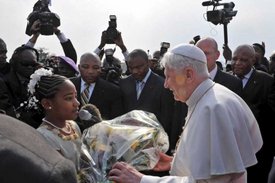 Friends, I wish to say that my visit to
Friends, I wish to say that my visit to
The Church, in accordance with the will of her divine founder, you will always find standing alongside the poorest of this continent. I wish to assure each of you that for her part, through diocesan initiatives, through the innumerable educational, healthcare and social works of Religious Orders, and through the development programmes of Caritas and other agencies, the Church will continue to do all she can to support families - including those suffering the harrowing effects of HIV/Aids - and to uphold the equal dignity of women and men, realized in harmonious complementarity. The Christian spiritual journey is one of daily conversion. To this the Church invites all leaders so that the path opened for all humanity will be one of truth, integrity, respect and compassion.
Pope Benedict XVI's address to the Civil Authorities and Diplomatic Corps of Angola
"Today it is up to you, brothers and sisters, following in the footsteps of those heroic and holy heralds of God, to offer the risen Christ to your fellow citizens. So many of them are living in fear of spirits, of malign and threatening powers. In their bewilderment they end up even condemning street children and the elderly as alleged sorcerers."
Pope Benedict was critical of the idea of seeking to convert people to the offense of believers of other faiths. "Someone may object: 'Why not leave them in peace? They have their truth, and we have ours,'" he said. "We do no injustice to anyone if we present Christ to them and thus grant them the opportunity of finding their truest and most authentic selves, the joy of finding life," he added. For Pope Benedict the faith is never imposed on anyone; the beauty of the faith is proposed.
21 March 2009
The reading at Lauds this morning is both apropos for Lent and for the Solemnity of Saint Benedict. Father Abbot, decorated with a beautiful pectoral cross of ancient days, read Sirach 2:1-18. Without knowing at first where the reading came from, I first thought it to be from one of the Fathers of the Church, or even Pope Benedict; all of what Sirach speaks of resonates strongly for me because it corresponds with what I've experienced and know deeply in my heart, and I hope it's the similarly for you. The text follows:
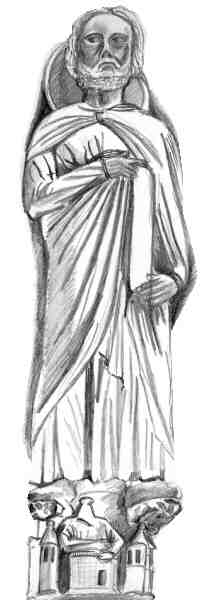 My son, if you come forward to serve the Lord, prepare yourself for temptation. Set your heart right and be steadfast, and do not be hasty in time of calamity. Cleave to him and do not depart, that you may be honored at the end of your life. Accept whatever is brought upon you, and in changes that humble you be patient. For gold is tested in the fire, and acceptable men in the furnace of humiliation.
My son, if you come forward to serve the Lord, prepare yourself for temptation. Set your heart right and be steadfast, and do not be hasty in time of calamity. Cleave to him and do not depart, that you may be honored at the end of your life. Accept whatever is brought upon you, and in changes that humble you be patient. For gold is tested in the fire, and acceptable men in the furnace of humiliation.
Trust in him, and he will help you; make your ways straight, and hope in him. You who fear the Lord, wait for his mercy; and turn not aside, lest you fall. You who fear the Lord, trust in him, and your reward will not fail; you who fear the Lord, hope for good things, for everlasting joy and mercy. Consider the ancient generations and see: who ever trusted in the Lord and was put to shame? Or who ever persevered in the fear of the Lord and was forsaken? Or who ever called upon him and was overlooked? For the Lord is compassionate and merciful; he forgives sins and saves in time of affliction.
Woe to timid hearts and to slack hands, and to the sinner who walks along two ways! Woe to the faint heart, for it has no trust! Therefore it will not be sheltered. Woe to you who have lost your endurance! What will you do when the Lord punishes you? Those who fear the Lord will not disobey his words, and those who love him will keep his ways. Those who fear the Lord will seek his approval, and those who love him will be filled with the law. Those who fear the Lord will prepare their hearts, and will humble themselves before him. Let us fall into the hands of the Lord, but not into the hands of men; for as his majesty is, so also is his mercy.
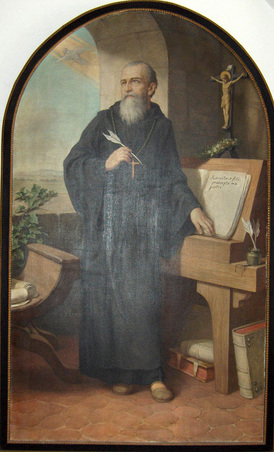 On the eve of the Solemnity of Saint Benedict, it is good to think with what the various popes have said about this famous and holy monk, Saint Benedict:
On the eve of the Solemnity of Saint Benedict, it is good to think with what the various popes have said about this famous and holy monk, Saint Benedict:
After his pious death, when the holy Patriarch went to heaven, the Order of monks he founded was far from failing or collapsing; rather, it seemed not only to be over nourished and strengthened by his living example, but also to be supported and vivified by his heavenly patronage, so that it went on increasing year by year. (Pope Pius XII, 1947)
When darkness seemed to be spreading over
At the heart of St. Benedict's monastic experience is a simple, typically Christian principle, which the monk adopts in all its radicalness: to unify one's life around the primacy of God. This "tenere in unum", the first, fundamental condition for entering monastic life, must be the commitment unifying the life of the individual and the community, and be expressed in the "conversatio morum" which is fidelity to a life-style lived concretely in daily obedience. The search for Gospel simplicity requires continual examination, that is, the effort "to do the truth", by constantly returning to the initial gift of the divine call which is at the root of one's own religious experience. (Pope John Paul II, 1999, 1500th anniversary of the founding of Subiaco)
...with his life and work St. Benedict exercised a fundamental influence on the development of European civilization and culture" and helped
Weather-wise, the day was spectacular. The day was spent at the modest lake house the abbey has had for many years on
Brother Anthony was tired of sowing seed so he showed the inspirational video "The Everyday," a narrative about the monkish life at Mount Savior Monastery in
In all the day was a nice getaway with confreres. And let's hope that it rains soon and that the birds don't get fat on the seed.
Excerpts from the Pope's speech at the Cardinal Paul-Émile Léger Centre, Cameroon, yesterday:
Faced with suffering, sickness and death, it is tempting to cry out in pain, as Job did, whose name means "suffering" (cf. Gregory the Great, Moralia in Job, I,1,15). Even Jesus cried out, shortly before his death (cf. Mk
In the presence of such torment, we feel powerless and we cannot find the right words. Before a brother or sister plunged into the mystery of the Cross, a respectful and compassionate silence, a prayerful presence, a gesture of tenderness and comfort, a kind look, a smile, often achieve more than many words. This was the experience of a small group of men and women, including the Virgin Mary and the Apostle John, who followed Jesus in the depths of his suffering at the time of his Passion and his death on the Cross. Among them, the Gospel tells us, was an African, Simon of Cyrene. He was given the task of helping Jesus to carry his Cross on the way to  executioners. Simon of Cyrene could not have known that it was his Saviour who stood there before him. He was "drafted in" to assist him (cf. Mk15:21); he was constrained, forced to do so. It is hard to accept to carry someone else's cross. Only after the resurrection could he have understood what he had done. Brothers and sisters, it is the same for each of us: in the depths of our anguish, of our own rebellion, Christ offers us his loving presence even if we find it hard to understand that he is at our side. Only the Lord's final victory will reveal for us the definitive meaning of our trials.
executioners. Simon of Cyrene could not have known that it was his Saviour who stood there before him. He was "drafted in" to assist him (cf. Mk15:21); he was constrained, forced to do so. It is hard to accept to carry someone else's cross. Only after the resurrection could he have understood what he had done. Brothers and sisters, it is the same for each of us: in the depths of our anguish, of our own rebellion, Christ offers us his loving presence even if we find it hard to understand that he is at our side. Only the Lord's final victory will reveal for us the definitive meaning of our trials.
Can it not be said that every African is in some sense a member of the family of Simon of Cyrene? Every African who suffers, indeed every person who suffers, helps Christ to carry his Cross and climbs with him the path to
 Since the resurrection, and right up to our own time, there have been countless witnesses who have turned, with faith and hope, towards the Saviour of mankind, recognizing his presence at the heart of their suffering. May the Father of mercies graciously grant the prayers of all who turn to him. He answers our call and our prayer, as and when he wishes, for our good and not according to our desires. It is for us to discern his response and to accept the gifts that he offers us as a grace. Let us fix our gaze upon the Crucified one, with faith and courage, for from him come life, comfort, and healing. Let us learn to gaze on him who desires our good and knows how to wipe the tears from our eyes. Let us learn to abandon ourselves into his embrace, like a small child in his mother's arms.
Since the resurrection, and right up to our own time, there have been countless witnesses who have turned, with faith and hope, towards the Saviour of mankind, recognizing his presence at the heart of their suffering. May the Father of mercies graciously grant the prayers of all who turn to him. He answers our call and our prayer, as and when he wishes, for our good and not according to our desires. It is for us to discern his response and to accept the gifts that he offers us as a grace. Let us fix our gaze upon the Crucified one, with faith and courage, for from him come life, comfort, and healing. Let us learn to gaze on him who desires our good and knows how to wipe the tears from our eyes. Let us learn to abandon ourselves into his embrace, like a small child in his mother's arms.
The Franciscan Friars of the Renewal are growing and rumors of the friars receiving pontifical recognition later in the spring flowering.
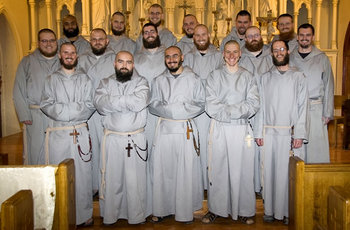 The novice master Father Glenn Sudano has his hands full with 17 new novices. He invested them with the grey habit recently. May they be given the grace of perseverance. The novitiate is at Most Blessed Sacrament Friary in
The novice master Father Glenn Sudano has his hands full with 17 new novices. He invested them with the grey habit recently. May they be given the grace of perseverance. The novitiate is at Most Blessed Sacrament Friary in
More pictures here.
The vocation director, Father Gabriel, would be happy to hear from you if you thought God was calling you to a mendicant's vocation. Call him at (212) 281-4355.
Behold a faithful and prudent servant, whom the Lord has set over His household. (Magnificat antiphon)
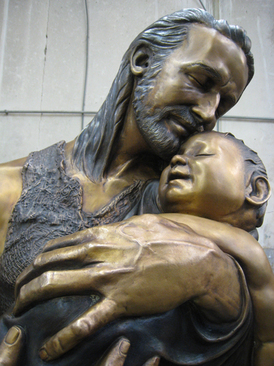 The instinct of
The instinct of
Later in life, the famed emeritus archabbot of Saint Meinrad Archabbey, Lambert, told me that his own religious life and service as a priest would have been less than adequate without his devotion to
The March 2009 issue of Touchstone magazine published an article by Joseph R. Fornieri entitled, "The Good Father." A worthwhile look at Joseph's place in Christianity.
At last night's Vespers Cameron the Pope delivered a homily speaking of
What would a friendship, a family, a parish community, a Benedictine abbey, indeed the world be like if we actually loved the other person without possessing him or her and if we followed (a truer meaning of the word 'obedience') the Word of God? Would our happiness explode? Would we live without counting the cost? Would we loose anything of value of ourselves?
The Catholic Information Service has a wonderful booklet on
My friends, I believe a particularly urgent task of religion today is to unveil the vast potential of human reason, which is itself God's gift and which is elevated by revelation and faith. Belief in the one God, far from stunting our capacity to understand ourselves and the world, broadens it. Far from setting us against the world, it commits us to it. We are called to help others see the subtle traces and mysterious presence of God in the world which he has marvellously created and continually sustains with his ineffable and all-embracing love. Although his infinite glory can never be directly grasped by our finite minds in this life, we nonetheless catch glimpses of it in the beauty that surrounds us. When men and women allow the magnificent order of the world and the splendour of human dignity to illumine their minds, they discover that what is "reasonable" extends far beyond what mathematics can calculate, logic can deduce and scientific experimentation can demonstrate; it includes the goodness and innate attractiveness of upright and ethical living made known to us in the very language of creation.
This insight prompts us to seek all that is right and just, to step outside the restricted sphere of our own self-interest and act for the good of others. Genuine religion thus widens the horizon of human understanding and stands at the base of any authentically human culture. It rejects all forms of violence and totalitarianism: not only on principles of faith, but also of right reason. Indeed, religion and reason mutually reinforce one another since religion is purified and structured by reason, and reason's full potential is unleashed by revelation and faith.
Pope Benedict XVI address to the Muslim Leaders of Cameroon
Apostolic Nunciature
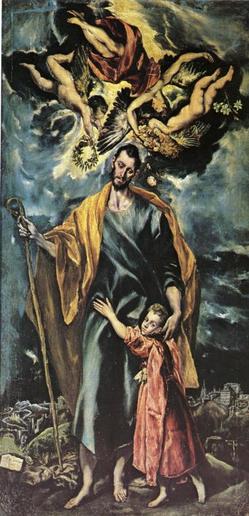 A just man honored from above,
A just man honored from above,
A silent man, a man of love,
On exile's road, in family home.
A man who acted on the word,
He carried out what he had heard:
He took the Mother and he Child
From scorner's stone and tyrant wild.
A man of faith, a man of trust,
He bore whatever loss he must
To keep the Mother and he Son
Until his life's great work was done.
We praise you, God of majesty,
One holy, threefold Mystery;
Be Father, Son, and Spirit blest
By all who share in ev'ning's rest.
The Benedictine monk vows obedience, stability and conversion of life.
Stability = God is not elsewhere; being in one place allows you to live your vocation in love and grace over the long haul, rejecting the novelty of moving here-and-there
Obedience = When my will is cracked open grace comes in
Conversion of Life = Our true selves are oriented toward the Divine Mystery. Why not be transformed into a living flame of love?
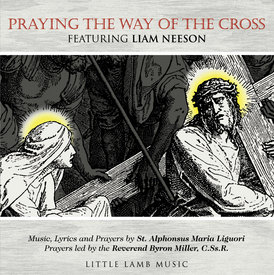 Liam Neeson, one of the leading international motion picture actors of our day, reads the Introduction, written by Saint Alphonsus Maria Liguori, and the 14 Stations of the Cross. The 14 Stations and prayers are taken from the classic text, The Way of the Cross according to the Method of St. Alphonsus Liguori, the great 18th century Italian saint, doctor of the Church and founder of the Redemptorists. This text is used by Catholics around the world to retrace the footsteps of Jesus Christ on Good Friday.
Liam Neeson, one of the leading international motion picture actors of our day, reads the Introduction, written by Saint Alphonsus Maria Liguori, and the 14 Stations of the Cross. The 14 Stations and prayers are taken from the classic text, The Way of the Cross according to the Method of St. Alphonsus Liguori, the great 18th century Italian saint, doctor of the Church and founder of the Redemptorists. This text is used by Catholics around the world to retrace the footsteps of Jesus Christ on Good Friday.
"I had heard about the Redemptorists and their missionary work in the Amazon
The Very Reverend Father Thomas D. Picton, provincial superior of the
Ray Herrmann, co-founder of Little Lamb Music, has spent the last 20 years playing with and arranging music for some of the biggest names in American music, including: Diana Ross, Chicago, Bob Dylan, Santana, LeeAnn Rimes, Stevie Wonder, George Benson and Herbie Hancock. Ray is also in the house band on the hit television show, American Idol.
Proceeds from the sale of the CD support the work of the Redemptorist missions in
To order the CD go to: www.littlelambmusic.com or call (800) 231-1207
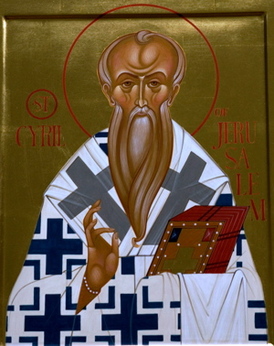 The Lord led the just in right paths. And showed him the
The Lord led the just in right paths. And showed him the
We beseech Thee, almighty God, grant us through the intercession of Thy blessed Bishop Cyril, so to know Thee, the one true God, and Jesus Christ Whom Thou has sent, that we may deserve to be numbered forever among the sheep that hear His voice.
Since Christ Himself has said, "This is My Body" who shall dare to doubt that It is His Body? (Saint Cyril of
Saint Cyril's catechetical lectures now available online.
 Last autumn, www.ilsussidiario.net, an internet news portal edited by the Foundation of Subsidiarity directed by Giorgio Vittadini, sponsored a special "On the Spot" section with articles from US-based writers on aspects of the presidential election. This was a start for what will now be a new regular English-language section of the site.
Last autumn, www.ilsussidiario.net, an internet news portal edited by the Foundation of Subsidiarity directed by Giorgio Vittadini, sponsored a special "On the Spot" section with articles from US-based writers on aspects of the presidential election. This was a start for what will now be a new regular English-language section of the site.
 The editors are happy to announce the birth of the English section of the daily "Il Sussidiario" divided in three sections: Politics & Society, Economy & Finance, Culture, Religion & Science.
The editors are happy to announce the birth of the English section of the daily "Il Sussidiario" divided in three sections: Politics & Society, Economy & Finance, Culture, Religion & Science.
Add this link to your favorites:
http://www.ilsussidiario.net/articoli.aspx?canale=103The "On the Spot" section will feature news and opinion pieces on all aspects of life in the
Looking for writers. There is a need to produce at least two or three original articles weekly of about 450-650 words. In addition, some of the articles would be translated into Italian for a daily audience of 3000 people.
If you would like to join us in this venture, please write to clairityrose@gmail.com.
Attending to the daily round of the Divine Office the prayers of the psalmist start to make sense and have a certain impact on the soul. Trust in the words of the psalmist is not based on sentiment --that would be a waste of time-- but on relationship between faith and reason viz. our relationship with God. We reach out to God and God bends down to touch our hearts. Moreover, the various hymns we sing, especially the ones we frequently sing during a particular liturgical season, begin to have an impact on our spiritual and human life. If they don't, then we're wasting our time: empty words lacking conviction and human desire.
Fasting has never made any sense to me unless I made did it with the reasonableness of all of what I believed about the presence of Christ my life, and the relationship I share with Him. Fasting also lacks meaning unless it is rooted in sacred Scripture, of both Testaments, especially and essentially looking to Christ's own example as a model for me. Now I am a weak man and I rely on grace for much. I suspect this is true not only for me, but for others as well. Furthermore, feasting on sumptuous foods and fine wines is rather meaningless unless there's been a discipline fast from things that draw our hearts, minds and bodies which opens up our senses for the best the Lord has to offer. Of course, I am not advocating the doing of things that are impracticable, for Aquinas tells of the art of the possible.
A 6th century Latin hymn at Lauds today made me think of fasting given that the Lord had done so when he walked this good earth. The hymn's author states: "for Christ, through whom all things were made, himself has fasted and has prayed" and then he petitions the Lord: "Then grant us, Lord, like them to be full oft in fast and prayer with thee; our spirits strengthen with thy grace, and give us joy to see thy face." First we acknowledge the fact that the Lord engaged in fasting to focus His attention on the Divine Will and to ward off temptation. The implication is that we are to imitate the Lord's example while asking for the grace of strength in an attempt to do spiritual battle with the certain hope of beholding the face of the Redeemer.
To that end, I was pleasantly surprised to see today's essay on the First Things blog on fast and feast. Peter Liethart's essay "Keep the Fast, Keep the Feast" is a superb reflection on the meaning of a Christian's fast and feast in Lent.
What banquet are you are preparing to eat? Or are you going to eat from the dumpster? What does the fast and feast mean to you? Are you patterning your life according to Christ's example? In what ways is the Lord preparing you to fully enter into beatitude? Do these Christian practices bring you closer to Christ and the Christian proposal to fully live?
 Holy Mary, Mother of God, Protectress of Africa, you have given to the world the true Light, Jesus Christ. Through your obedience to the Father and the grace of the Holy Spirit, you have given us the source of our reconciliation and our justice, Jesus Christ, our peace and our joy. Mother of Tenderness and Wisdom, show us Jesus, your Son and the Son of God. Guide our path of conversion, so that Jesus might shine his glory on us in every aspect of our personal, familial and social lives.
Holy Mary, Mother of God, Protectress of Africa, you have given to the world the true Light, Jesus Christ. Through your obedience to the Father and the grace of the Holy Spirit, you have given us the source of our reconciliation and our justice, Jesus Christ, our peace and our joy. Mother of Tenderness and Wisdom, show us Jesus, your Son and the Son of God. Guide our path of conversion, so that Jesus might shine his glory on us in every aspect of our personal, familial and social lives.
Mother, full of Mercy and Justice, through your docility to the Spirit, the Counselor, obtain for us the grace to be witnesses of the Risen Lord, so that we will increasingly become the salt of the earth and the light of the world.
Mother of Perpetual Help, we entrust to your maternal intercession the preparation and fruits of the Second Special Assembly for
House Bill 2354, Illinois State Freedom of Choice Act (FOCA), passed the Illinois House Human Services Committee on March 11. The bill will now head to the Illinois House floor for the consideration of the entire body.
"Vote NO on HB 2354. The bill is extreme. It declares abortion to be a fundamental right and it invalidates a health care professional's right of conscience."
The bill also seeks to :
- Make abortion a fundamental right, preventing any common-sense regulation such as parental notification
- Expand public funding of abortion through Medicaid at a time when the State cannot even meet its current fiscal obligations
- Invalidates the Illinois Health Care Right of Conscience Act protecting health care professionals and employers
- Mandate comprehensive sex education for all children in public schools
- Establish a liability shield for abortion providers who harm pregnant women
Visit the Illinois General Assembly's web site at www.ilga.gov to find your Legislator. If you encounter any difficulties, please call the Catholic Conference of Illinois at 312-368-1066.
Cardinal Francis E. George's letter on HB 2354:
Cardinal's letter HB2354.pdf
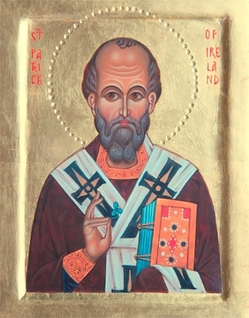 God our Father, You sent Saint Patrick to preach Your glory to the people of
God our Father, You sent Saint Patrick to preach Your glory to the people of
Saint Patrick's Breast-Plate
(or "Lorica")
I bind to myself today
The strong virtue of the Invocation of the Trinity:
I believe the Trinity in the Unity
The Creator of the Universe.
I bind to myself today
The virtue of the Incarnation of Christ with His Baptism,
The virtue of His crucifixion with His burial,
The virtue of His Resurrection with His Ascension,
The virtue of His coming on the Judgment Day.
I bind to myself today
The virtue of the love of seraphim,
In the obedience of angels,
In the hope of resurrection unto reward,
In prayers of Patriarchs,
In predictions of Prophets,
In preaching of Apostles,
In faith of Confessors,
In purity of holy Virgins,
In deeds of righteous men.
I bind to myself today
The power of Heaven,
The light of the sun,
The brightness of the moon,
The splendor of fire,
The flashing of lightning,
The swiftness of wind,
The depth of sea,
The stability of earth,
The compactness of rocks.
I bind to myself today
God's power to guide me,
God's Might to uphold me,
God's Wisdom to teach me,
God's Eye to watch over me,
God's Ear to hear me,
God's Word to give me speech,
God's Hand to guide me,
God's Way to lie before me,
God's Shield to shelter me,
God's Host to secure me,
Against the snares of demons,
Against the seduction of vices,
Against the lust of nature,
Against everyone who meditates injury to me,
Whether far or near,
Whether few or with many.
I invoke to-day all these virtues
Against every hostile merciless power
Which may assail my body and my soul,
Against the incantations of false prophets,
Against the black laws of heathenism,
Against the false laws of heresy,
Against the deceits of idolatry,
Against the spells of women, and smiths, and druids,
Against every knowledge that binds the soul of man.
Christ, protect me today
Against every poison, against burning,
Against drowning, against death-wound,
That I may receive abundant reward.
Christ with me, Christ before me,
Christ behind me, Christ within me,
Christ beneath me, Christ above me,
Christ at my right, Christ at my left,
Christ in the fort,
Christ in the chariot seat,
Christ on the deck,
Christ in the heart of everyone who thinks of me,
Christ in the mouth of everyone who speaks to me,
Christ in every eye that sees me,
Christ in every ear that hears me.
 I bind to myself today
I bind to myself today
The strong virtue of an invocation of the Trinity.
I believe the Trinity in the Unity,
The Creator of the Universe.
(This prayer is believed to have been composed by Saint Patrick in preparation for this victory over paganism. The saint died on this day in 493)
An article by Father Julián Carrón, President of the Fraternity of Communion and Liberation, has been published by the Italian daily, Avvenire. The article is titled "A Challenging Mercy" and is related to the letter Pope Benedict addressed to all Bishops after the polemics about the lifting of the excommunication of bishops in the Society of St. Pius X. I recommend the article.
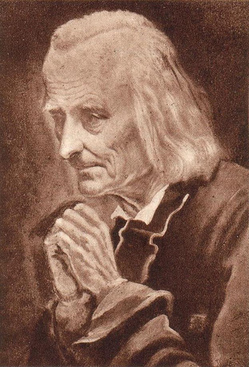 On the occasion of the 150th anniversary of the death of the Saint Curé of Ars, John Mary Vianney, His Holiness announced this morning that from
On the occasion of the 150th anniversary of the death of the Saint Curé of Ars, John Mary Vianney, His Holiness announced this morning that from
During this Jubilee Year Benedict XVI proclaimed Saint John Mary Vianney "Patron of all priests of the world." He will publish a Directory for Confessors and Spiritual Directors together with a collection of writings of the Supreme Pontiff concerning the essential themes of the life and mission of the priesthood today.
The Congregation for the Clergy together with the diocesan ordinaries and superiors of religious institutes will collaborate in promoting and coordinating the various spiritual and pastoral initiatives that concern the importance of the life and mission of the spriest in the Church and in contemporary society, the necessity of competent permanent formation of priests and seminarians.
The Pope will opens the special Year on 19 June with Vespers in St. Peter's Basilica where the relics of the saintly 'Cure of Ars' will be brought by Bishop Guy Bagnard of Belley-Ars,
A video clip of the announcement from H2O News.
The gospel proclaimed at Mass today (if you are not doing the 3rd scrutiny) comes from
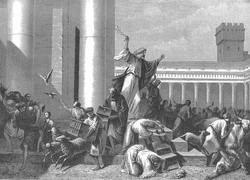 -Do we meet the Lord and others in humility?
-Do we meet the Lord and others in humility?
-Are we faithful to the Lord as are able?
-Do we take time to know what the Lord is saying through the teaching of the Church, his sacrament on earth?
-When someone has a problem in understanding the faith, as we've seen recently in Connecticut S.B. 1098 and now with S.B. 899, do we take the time to understand the matter, look for the correct teaching and teach what the Church offers us for the good of our souls and for happiness?
-Are we deaf to the physical and spiritual, culture and social needs of our brothers and sisters?
-In watching the greed of Bernie Madoff unfold, can we might have to overturn the tables of our own greed?
-What are the sacrileges that we cling to so mightily, blasphemies with names like, hate, indifference, unkindness, gossip, unreasonableness, and inertia?
-Do we know what's happening in our world well-enough to make changes where we stand? Would we be able to stop war, crime, violence, and abuse?
The house of God Jesus cleans is not merely the
If we really believe the Lord's promises are true, can we rededicate ourselves to God today and accept the fact that the blood of Lamb -Jesus Christ--really saves us and urges us onward?
The Lord is not merely asking us to rearrange the furniture in our lives which may feel a bit comfortable TEMPORARILY, He's asking us to change the color of our room, the bedding, the artwork, and the flooring we stand on PERMANENTLY. But the permanence is only possible if we ask for the grace to follow the Lord. Zeal for God's house will consume me.
We know by experience that we have not sufficient strength in ourselves to bring to a successful completion our chief Lenten duty, which is to die fully to sin in order to live fully in the risen Christ. But Christ himself, before leaving his own, prayed to his Father to preserve them from evil and from the evil one (John
He had taught them to ask: lead us not into temptation, but deliver us from evil (Matthew
Fr. Gabriel of St. Mary Magdalen, OCD
Divine IntimacyTom Hoopes at the National Catholic Register opened my eyes this morning with a brief article on the State of Connecticut's intrusion into matters of faith, doctrine and Church.
Last week had SB 1098; now we have to contend with SB 899. This new bill being proposed is wide reaching and very intrusive and just plain wrong, not just in matters of faith but culture, government and parenting.
The problem is education: the lack of it retards greater freedom and happiness for which we are made for by God: beatitude.
Ignatian spirituality is a method of prayer bequeathed to the Church by the 16th century Basque saint, Ignatius of Loyola. It is a spirituality grounded in the fundamental idea that God labors for us, that He is active in the daily life of man and woman. This spirituality is rooted in the Gospel and in the heart of the Catholic Church. This is a radical theological concept because, for instance, Muslims think it's heretical to think that God became man (that the Incarnation is a fact) and that we could (a) know the will of God; (b) that we could have a personal relationship with Him (in Jesus & the Holy Spirit) and (c) that God is always present to us. So, what does Ignatius give us? He wants "above all...you to increase the pure love of Jesus Christ in the desire of His glory and the salvation of the souls which He has redeemed." This is a spirituality that trains us to "find God in all things."
Ignatius wrote the Spiritual Exercises as a lay man with the singular intention of drawing others to Christ. The Exercises are guideposts, that is, notes for a spiritual director to use in orienting a retreatant on his or her retreat and are not meant to be read as one would read a novel. As other spiritualities are, the Ignatian way is unique for its constant attention to one's intimate relationship with Jesus and discerning the will of God in each person's life. It is not merely a technique for making good decisions; for that you can seek the counsel of your favorite philosopher; it is a personal way of living graces given to us God. You may say that Ignatian spirituality is way of acknowledging and living the happiness that God's wills for each of us. I find Ignatius' method to be a practical spirituality that's particularly suited to the needs and desires of Christians today.
Ignatian spirituality sees God as actively involved in the world and intimately involved with us in every moment and place. We therefore say that God is in the center of reality, in the mess of history redeeming humanity. We can say with Saint Ignatius that "God's love is poured forth lavishly like a fountain spilling forth its waters into an unending stream."Withdrawing from the world into a quiet place in order to find God is understandable but withdrawing from the world is not particularly "Ignatian" for the long haul. That is why Ignatius spoke of those who follow the Exercises as living a life contemplation in action. It is perfectly acceptable to spend an 8-day retreat in the quiet of a monastery or a secluded retreat house. Nevertheless, the virtue of this type spirituality is that is God encountered everywhere--in our work and our relationships, in our family and friends, in our sorrows and joys, in the sublime beauty of nature and in the mundane details of our daily lives. One caution: our work, relationships, family, friends and any other possible detail doesn't replace our relationship with God,nor does it replace the sacraments, Mass, personal prayer and sacrifice. That is, you can't hold that "my work is my prayer" and think you are actually following an authentic spirituality. But it is true that God is present to us and we are present to God through all these things (the daily grind of our lives) because of the Incarnation.
From history we know that Loyola
is the founder, under the guidance of the Holy Spirit, of the Society of Jesus,
a religious order of priests and brothers called to preach Jesus Christ in
communion with the Pope under the standard of the Cross. Since the 1960s a
Jesuit defined himself as a sinner redeemed (loved) by Christ. The motto of the
Jesuits is Ad maiorem Dei gloriam (To the greater glory of God) which is based
on the Benedictine motto of Ut in omnibus glorificetur Deus (That in all things
God may be glorified, 1 Peter 4:11): hence, the work of Ignatian spirituality
is a life spent glorifying God using everything God has given us in order to live in communion with Him.
Jesuit Father Edward T. Oakes, a Mundelein Seminary Theology professor explains Pope Benedict's VERY clear reasons for putting to bed the ex communications of the SSPX bishops while delving into the acceptance of (or not) "Vatican II theology." What Vatican II said is a bone of contention of many, for a very long time....
You've got to read the article, Benedict's Vatican II Hermeneutic in First Things!
From outside she [the Church] looks like an establishment, like one organization among others. From within she is the medium, one might almost say the magic, whereby God is able to be all in all within his creation, without suppressing the creature he has made free.
(Hans Urs Von Balthasar, In the Fullness of Faith)
Spreading...makes life more interesting, or a least it makes the flowers grow. Yesterday Gail, the abbot's administrative assistant, brought me a gift, a token of appreciation. Well, I requested it so it's technically not a gift. Gail brought me a feed bag of mature horse manure from her own horses; it's mature manure I am assured. I got a phone call from Brother Anthony saying that I had a bag of ... manure on the front steps. Not wanting to offend guests I quickly moved the bag to the Saint Francis garden.
 Before the night rain fell and after vespers but before the total loss of daylight, I made a mad-dash to the garden to spread the "garden tea." I couldn't help but remember -and laughing riotously-- at what a senior Jesuit friend of mine said of Jesuits and horse manure: if you keep Jesuits together they stink; if you spread them around, they fertilize. I think you get the point. Besides hoping for the cooperative intercession of Saint Francis, I am expecting the manure to heighten the garden's capacities.
Before the night rain fell and after vespers but before the total loss of daylight, I made a mad-dash to the garden to spread the "garden tea." I couldn't help but remember -and laughing riotously-- at what a senior Jesuit friend of mine said of Jesuits and horse manure: if you keep Jesuits together they stink; if you spread them around, they fertilize. I think you get the point. Besides hoping for the cooperative intercession of Saint Francis, I am expecting the manure to heighten the garden's capacities.
Much of last week I had my friend Brother Michael visiting me. It was nice to have him here. As it is said, "Hospes venit, Christus venit." A stranger comes, Christ comes. This saying is part of the Rule of Saint Benedict and we often find it on signs at Benedictine monasteries: "Let every stranger be received as Christ himself." Brother Michael is not a stranger to me but he was to members of the community for a very short time. The others we edified by his presence and I got a chance to share life with a friend.
Last Saturday we had the privilege of welcoming back to the Abbey and the College Father Dwight Longenecker, an Oblate of Saint Benedict, to speak to interested parties on Saint Thérèse of Lisieux and her "little way" as a fitting approach to living Lent. His blog, Standing on My Head is a popular read.
These last days have been interesting and boring at the same time. More painting is taking place. This time we're doing the Compline room, the place where Night Prayer is prayed; it badly needed some fresh paint on the walls. We also did some garden work in a neglected area of the monastery gardens and we did some odds-and-ends.
One of the postulants decided to leave the abbey thus ending his discernment in following a monastic vocation. Mary, Help of Christians - Belmont Abbey is much the poorer. Andrew is 24 and a recent grad of
My fun reading this week is a book on the Solesmes and Dom Gueranger: 1805-1875 (Paraclete Press, 1996).
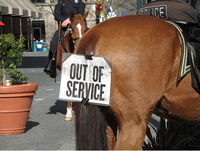 Life in a monastery is fun. Oh, yea, the flowering trees are working hard to push out the color!!!! AND now I need more manure.
Life in a monastery is fun. Oh, yea, the flowering trees are working hard to push out the color!!!! AND now I need more manure.
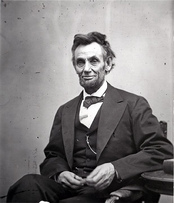 A new drama about the life of Abraham Lincoln and the role that his fourteen years in Spencer County, Indiana, played is being planned for the bicentennial of his birth in 2009.
A new drama about the life of Abraham Lincoln and the role that his fourteen years in Spencer County, Indiana, played is being planned for the bicentennial of his birth in 2009.
In the published comments of Pope Benedict to the distinguished representatives of the Chief Rabbinate of
The Church recognizes that the beginnings of her faith are found in the historical divine intervention in the life of the Jewish people and that here our unique relationship has its foundation. The Jewish people, who were chosen as the elected people, communicate to the whole human family, knowledge of and fidelity to the one, unique and true God. Christians gladly acknowledge that their own roots are found in the same self-revelation of God, in which the religious experience of the Jewish people is nourished.
I sit choir with a group of monks and other Christians praying the Scritpures on a daily basis and I'm coming to understand (judge, evaluate) more and more the connections, i.e., the reality that exists between Jewish and Catholic theology/liturgy. This is especially true in the Psalms but no less with the daily readings from Pentateuch and the Prophets. One of the books I am re-reading selections from these days is Father Richard Veras' book, Jesus of Israel: Finding Christ in the Old Testament (Servant Books, 2007), who speaks about the promises made to us down through the ages by the Lord, promises of the hundredfold, promises of life, liberation and communion with the Lord as they are revealed in the sacred Scriptures.
For what it's worth, Pope Benedict said the following 19 years ago when he was still known as Joseph Ratzinger, the CDF Prefect:
Abraham, father of the people of Israel, father of faith, thus become the source of blessing, for in him all the families of the earth shall call themselves blessed. The task of the Chosen People is, therefore, to make a gift of their God - the one true God - to every other people; in reality, as Christians we are the inheritors of their faith in the one God. Our gratitude, therefore, must be extended to our Jewish brothers and sisters who, despite the hardships of their own history, have held on to faith in this God right up to the present, and who witness to it in the sight of those peoples who, lacking knowledge of the one God, dwell in darkness and in the shadow of death.
Down through the history of Christianity, already-strained relations deteriorated further, even giving birth in many cases to anti-Jewish attitudes, which throughout history have led to deplorable acts of violence. Even if the most recent, loathsome experience of the Shoah was perpetrated in the name of an anti-Christian ideology, which tried to strike the Christian faith at its Abrahamic roots in the people of Israel it cannot be denied that a certain insufficient resistance to its atrocity on the part of Christians can be explained by an inherited anti-Judaism present in the hearts of not a few Christians.
Perhaps it is precisely because of this latest tragedy that a new vision of the relationship between the Church and
It is evident that, as Christians, our dialogue with the Jews is situated on a different level than that in which we engage with other religions. The faith witnessed to by the Jewish Bible (the Old Testament for Christians) is not merely another religion to us, but is the foundation of our own faith. Therefore, Christians - and today increasingly in collaboration with their Jewish sisters and brothers - read and attentively study these books of Sacred Scripture, as a part of their common heritage. (Excerpts from Cardinal Ratzinger's "The Heritage of Abraham: The Gift of Christmas," L'Osservatore Romano,
In light of all of this public speaking I think today's allocution by the Pope reveals a consistent line of teaching not only by a man with a keen intellect and a profound faith in the Divinity but also consistent with magisterial teaching of the Holy See. Hence, I don't think that Benedict's thoughts today are not throw away lines to ease tensions, real or imaginary between the Catholic Church and the Jewish leadership. Moreover, I also don't think it's a political ploy before a papal visit to the
My sense is that the Pope is rather genuine in his judgment that Christians and Jews need each other because each provide an interpretative key in self-identity and the theological journey we both make toward our destiny. For Christians we need to grasp what is being done (the action) and what is said (the content) in order to take seriously our own faith in Jesus Christ as Lord, Savior and Brother. So no, these remarks today aren't lines denoting mere policy, mechanical ways to engage a touchy politic serving a group's interests. These lines reflect not only this pontiff's thinking but the Church's self-understanding and theological grounding. Nostra Aetate (1965) and Dabru Emet (2000) like documents demonstrate a commitment from which to work with each other in an effort to know, love and serve the Almighty while coming to understand a common theological and liturgical history. Consequently, Jews and Catholics should not only work on projects that serve the common good but also work for greater understanding in the process of dialogue leading to the eternal.
Some will say that the Pope made a nice gesture by speaking honestly with the Jews. But that would be yet another example of a tyranny of the "nice," and we don't need more "nice." What we need is true honesty, faith and reason before reality. What I believe the Pope is indicating to us is the profound need because it is reasonable as people of faith to draw deeply from the common faith experience in order to discern our relationship with the Lord and to foster a deeper communion between Jews and Christians. We need to understand the reality that's in front of us, the gift of friendship in faith with others on a similar path to destiny.
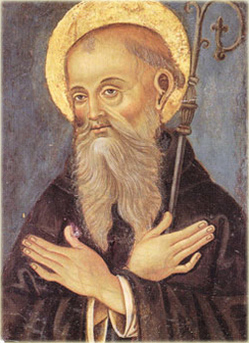 O Glorious St. Benedict, sublime model of all virtues, pure vessel of God's grace! Behold me, humbly kneeling at thy feet. I implore thy loving heart to pray for me before the throne of God. To thee I have recourse in all the dangers which daily surround me. Shield me against my enemies, inspire me to imitate thee in all things. May thy blessings be with me always, so that I may shun whatever God forbids and avoid the occasions of sin.
O Glorious St. Benedict, sublime model of all virtues, pure vessel of God's grace! Behold me, humbly kneeling at thy feet. I implore thy loving heart to pray for me before the throne of God. To thee I have recourse in all the dangers which daily surround me. Shield me against my enemies, inspire me to imitate thee in all things. May thy blessings be with me always, so that I may shun whatever God forbids and avoid the occasions of sin.Graciously obtain for me from God those favors and graces of which I stand so much in need, in the trials, miseries and afflictions of life. Thy heart was always so full of love, compassion, and mercy towards those who were afflicted or troubled in any way. Thou didst never dismiss without consolation and assistance anyone who had recourse to thee. I therefore invoke thy powerful intercession in the confident hope that thou will hear my prayers and obtain for me the special grace and favor I so earnestly implore (mention it), if it be for the greater glory of God and the welfare of my soul.
'Larger Than Life' Figure Dolan Taught What Priesthood Means
by Father Raymond J. de Souza
The garrulous Timothy Michael Dolan, preacher and raconteur extraordinaire, chooses his
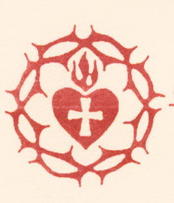 words carefully. And when ordained a bishop in 2001 in
words carefully. And when ordained a bishop in 2001 in
He then went on to express his joy in the priesthood, his love for the Church, his delight in his parishioners -- and also brought the house down with his ever-ready wit. The newly appointed archbishop of
Raised in a Catholic home in Ballwin, Mo., young Tim learned the faith from parents who never missed Mass -- but also looked forward to cold beer and barbecues on Sunday afternoon. That formation came to the fore when Archbishop Dolan remarked that, among other things he looked forward to in
 Critics of Archbishop Dolan consider the backslapping, guffawing, cigar-smoking, beer-drinking prelate an old Irish neighborhood pol, eager to lead the St. Patrick's Day parade but not sophisticated in the life of the mind or the life of the spirit. A faithful son of
Critics of Archbishop Dolan consider the backslapping, guffawing, cigar-smoking, beer-drinking prelate an old Irish neighborhood pol, eager to lead the St. Patrick's Day parade but not sophisticated in the life of the mind or the life of the spirit. A faithful son of
Father Dolan served as rector of the American seminary in
We were the privileged ones who regularly heard him preach -- and he is a superlative preacher -- not only during Mass, but at the memorable rector's conferences that were later collected and published to great acclaim under the title Priests for the Third Millennium.
The printed page cannot capture fully his enthusiasm -- and is excised of many of the in-house comments that provoked laughter all round -- no one enjoys his jokes more than he does. Yet, the conferences are evidence of a fine mind at work, with a facility for bringing the Church's perennial wisdom to current challenges. A historian by training, Msgr. Dolan taught a course on
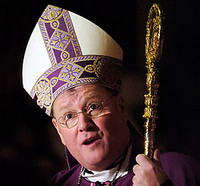 As a seminary rector, Msgr. Dolan lived the "both/and" intuition that is at the heart of the Catholic approach: both popular piety and liturgical prayer; both traditional music and contemporary styles of worship; both adherence to a rule and an encouragement of creative initiative; both theological orthodoxy and a cultivated life of the mind; both serious formation and fraternal good times; and, yes, both the pasta and the main course at pranzo. It was from Msgr. Dolan that I learned that the priesthood could be spiritually demanding, emotionally fulfilling, intellectually rigorous -- and fun!
As a seminary rector, Msgr. Dolan lived the "both/and" intuition that is at the heart of the Catholic approach: both popular piety and liturgical prayer; both traditional music and contemporary styles of worship; both adherence to a rule and an encouragement of creative initiative; both theological orthodoxy and a cultivated life of the mind; both serious formation and fraternal good times; and, yes, both the pasta and the main course at pranzo. It was from Msgr. Dolan that I learned that the priesthood could be spiritually demanding, emotionally fulfilling, intellectually rigorous -- and fun!
Before arriving at the NAC, I knew that the priesthood was a life of noble service, but looked ahead to a life of duty rather than looking forward to an enjoyable life. It has been repeated so often that it has become a caricature, but the first time I ever saw the rector, rosary in one hand and cigar in the other, I knew that I had found a compelling model of the priesthood.
My fellow seminarian at the time, Father Roger Landry, editor of the Diocese of Fall River, Mass., newspaper, The Anchor, has commented that Archbishop Dolan is a needed corrective to the perception that the Catholic faith is a necessary burden that strips the joy out of life. "If there's any priest in
The appointment itself showed Archbishop Dolan at his best.
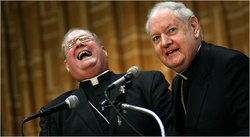 Not so much the bonhomie -- though only he could have slapped Cardinal Edward Egan on the back. It surely has been some time since the cardinalatial back had been so heartily thumped, but, then, Dolan has rarely encountered a back he considered unslappable. The real Dolanesque touch was to use the questions about the appointment as a teaching moment about the liberating potential of obedience.
Not so much the bonhomie -- though only he could have slapped Cardinal Edward Egan on the back. It surely has been some time since the cardinalatial back had been so heartily thumped, but, then, Dolan has rarely encountered a back he considered unslappable. The real Dolanesque touch was to use the questions about the appointment as a teaching moment about the liberating potential of obedience.
"I wasn't asked," he said simply of the message from the apostolic nuncio. He was told of the Holy Father's decision, and, therefore, the path was clear. Obedience can be liberating. It's a Christian truth, but a disputed one, and something that many of those watching in
"My own spiritual director believes that it is precisely in obedience -- not in celibacy, strangely enough -- that the priest of today is most countercultural," Dolan said. "This culture of denigrating obedience is particularly obvious in our beloved
When Archbishop Dolan arrives in
Father Raymond J. de Souza is a priest of the Archdiocese of Kingston (
Are you a member of the World Youth Alliance? Do you believe that young people can change our current culture to one that is based on the dignity of the human person and you want to help us share the experience of human dignity and solidarity with more young people?
Visit the WYA website today, and share it with your friends!
It's about dignity!
The World Youth Alliance is composed of young men and women from every part of the world. In cooperation with other organs of the international community, primarily the United Nations and the European Union, the World Youth Alliance is committed to building free and just societies through a culture of life. That culture affirms the inalienable dignity of the person, defends the intrinsic right to life, nurtures the family, and fosters a social climate favorable to integral development, solidarity, and mutual respect.
We recognize that the intrinsic dignity of the person is the foundation of every human right. We believe this dignity is independent of any individual condition and that no human community can grant or rescind that dignity.
We are convinced that the intrinsic dignity possessed by every human being from conception to natural death is the foundation of everyone's right to life. We believe that this inalienable right to life is the basis of a free and just society and we believe that society through law and culture has an obligation to protect the dignity of the person and thus protect the right to life.
We affirm that the fundamental unit of human society is the family, where men and women learn to live in genuine freedom and solidarity, and where individuals are equipped to fulfill their social obligations. We believe that the political community at the local, national and international level is obliged to protect and nurture the family.
|
We believe that the authentic development of society can occur only in a culture that fosters integral human development - characterized by physical, spiritual, mental, and emotional growth, in a climate of respect for the human person and the family. We invite all those who share these convictions to join us in affirming them and give them effect in public life at all levels. |
|
Observing the 200th anniversary of Charles Darwin's birth, the Vatican's Council for Culture, the Gregorian Univ. and the Univ. of Notre Dame gather a diverse group of intellectuals to discuss the matrix of faith and science, especially evolution. Watch the video clip.
A story from before the congress published by The Pew Forum on Religion and Public Life: Religion News, is informative.
The Pope pointed out that the example of the saints "shows that when a person encounters Christ, he is not enclosed in himself, but is open to the needs of others and, in every realm of society, puts the good of all before his own interests."
This evening's report on killing of the CT bill 1098 by Catholic News Service:
Bill giving laity control of parish finances killed in ConnecticutHARTFORD, Conn. (CNS) -- At the request of its proponents, a bill that would have given laypeople financial control of their parishes in Connecticut has been withdrawn and is dead for this legislative session. In a joint statement March 10, the co-chairmen of the Connecticut Legislature's Judiciary Committee, Sen. Andrew J. McDonald of Stamford and Rep. Michael Lawlor of East Haven, announced the cancellation of a scheduled March 11 hearing on the controversial bill. There was no immediate comment on the bill's demise from the Catholic bishops of Connecticut, who had strongly opposed the legislation and urged Catholics to turn out at the hearing in large numbers. "At the request of the proponents who are advocating this legislation, we have decided to cancel the public hearing for tomorrow, table any further consideration of this bill for the duration of this session, and ask the attorney general his opinion regarding the constitutionality of the existing law," said McDonald and Lawlor, both Democrats and Catholics. "It would serve no useful purpose to have a conversation about changing the laws that govern existing Roman Catholic corporations until we know if any of these existing laws are constitutional," they said.
For the moment the bill is off the table. Good. Prayers answered. BUT it's only a matter of time before this initiative (or something similar) is reintroduced --with sharper teeth-- which will shake the dander of faithful Catholics who hold firmly to Catholic teaching. Some will see this threat as lacking merit, but heterodox will pull something else to threaten the security of free exercise of religion. Sorry to say, fellow Nutmegers have tried to disrupt the unity of the Church. Senator Michael McLachlan this afternoon after announcing the tabling of the bill, "Now they [Andrew McDonald and Michael Lawler] want the Catholic Church to defend the laws on the books since 1866!" THE fight is not over...by a long shot.
Saint Michael, pray for us!!!
The editors of Headline Bistro, the headline service of the Knights Columbus, posted an analysis of the current situation regarding legislative bill 1098 introduced by two
Keeping up-to-date:
Carl Anderson's Op-Ed piece in the Stamford Advocate "Shredding the First Amendment in the
"Religious Freedom Under Attack in
The New Haven Register's March 9th article on the subject
The bill's chief proponent, Tom Gallagher, has an Op-Ed piece in the National Catholic Reporter.
This is a rather important talk Pope Benedict XVI gave while visiting the Oblates of Saint Frances of Rome. Every pope since the 16th century has visited this monastery. Pope John Paul was the last 25 years ago.
Dear Oblate Sisters,
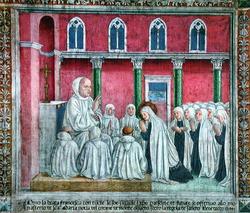 After my visit to the nearby Municipal Hall on the Capitoline Hill, I come with great joy to meet you at this historic Monastery of Santa Francesca Romana, while you are still celebrating the fourth centenary of her canonization on 29 May 1608. Moreover, the Feast of this great Saint occurs this very day, commemorating the date of her birth in Heaven. I am therefore particularly grateful to the Lord to be able to pay this tribute to the "most Roman of women Saints", in felicitous continuity with the meeting I have just had with the Administrators at the municipal headquarters. As I address my cordial greeting to your community, and in particular to the President, Mother Maria Camilla Rea whom I thank for her courteous words expressing your common sentiments I also extend my greeting to Auxiliary Bishop Ernesto Mandara, to the students who live here and to everyone present.
After my visit to the nearby Municipal Hall on the Capitoline Hill, I come with great joy to meet you at this historic Monastery of Santa Francesca Romana, while you are still celebrating the fourth centenary of her canonization on 29 May 1608. Moreover, the Feast of this great Saint occurs this very day, commemorating the date of her birth in Heaven. I am therefore particularly grateful to the Lord to be able to pay this tribute to the "most Roman of women Saints", in felicitous continuity with the meeting I have just had with the Administrators at the municipal headquarters. As I address my cordial greeting to your community, and in particular to the President, Mother Maria Camilla Rea whom I thank for her courteous words expressing your common sentiments I also extend my greeting to Auxiliary Bishop Ernesto Mandara, to the students who live here and to everyone present.
As you know, together with my collaborators in the Roman Curia, I have just completed the Spiritual Exercises which coincided with the first week of Lent. In these days I have experienced once again how indispensable silence and prayer are. And I also thought of St
Your monastery is located in the heart of the city. How is it possible not to see in this, as it were, the symbol of the need to bring the spiritual dimension back to the centre of civil coexistence, to give full meaning to the many activities of the human being? Precisely in this perspective your community, together with all other communities of contemplative life, is called to be a sort of spiritual "lung" of society, so that all that is to be done, all that happens in a city, does not lack a spiritual "breath", the reference to God and his saving plan. This is the service that is carried out in particular by monasteries, places of silence and meditation on the divine word, places where there is constant concern to keep the earth open to Heaven. Then your monastery has its own special feature which naturally reflects the charism of St
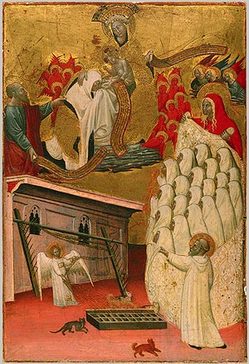 In our day too, Rome needs women and of course also men but here I wish to emphasize the feminine dimension women, as I was saying, who belong wholly to God and wholly to their neighbour; women who are capable of recollection and of generous and discreet service; women who know how to obey their Pastors but also how to support them and encourage them with their suggestions, developed in conversation with Christ and in first-hand experience in the area of charity, assistance to the sick, to the marginalized, to minors in difficulty. This is the gift of a motherhood that is one with religious self-gift, after the model of Mary Most Holy. Let us think of the mystery of the Visitation. Immediately after conceiving the Word of God in her heart and in her flesh, Mary set out to go and help her elderly kinswoman Elizabeth. Mary's heart is the cloister where the Word continues to speak in silence, and at the same time it is the crucible of a charity that is conducive to courageous gestures, as well as to a persevering and hidden sharing.
In our day too, Rome needs women and of course also men but here I wish to emphasize the feminine dimension women, as I was saying, who belong wholly to God and wholly to their neighbour; women who are capable of recollection and of generous and discreet service; women who know how to obey their Pastors but also how to support them and encourage them with their suggestions, developed in conversation with Christ and in first-hand experience in the area of charity, assistance to the sick, to the marginalized, to minors in difficulty. This is the gift of a motherhood that is one with religious self-gift, after the model of Mary Most Holy. Let us think of the mystery of the Visitation. Immediately after conceiving the Word of God in her heart and in her flesh, Mary set out to go and help her elderly kinswoman Elizabeth. Mary's heart is the cloister where the Word continues to speak in silence, and at the same time it is the crucible of a charity that is conducive to courageous gestures, as well as to a persevering and hidden sharing.
Dear Sisters, thank you for the prayers with which you always accompany the ministry of the Successor of Peter and thank you for your invaluable presence in the heart of
The Pope's visit to the monastery founded by Saint
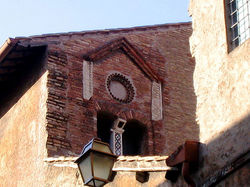 The spiritual dimension of life must be brought back to the centre of civil coexistence. Benedict XVI said this during his visit to the historical monastery of Saint Francesca Romana in Tor de Specchi near the Campidoglio.
The spiritual dimension of life must be brought back to the centre of civil coexistence. Benedict XVI said this during his visit to the historical monastery of Saint Francesca Romana in Tor de Specchi near the Campidoglio.
The Oblate sisters' community of contemplative life, in close connection with the Olivetani monks, is called to be society's "spiritual lung", in order maintain the reference to God and to His plan of salvation. The Pope noted that the convent, which was founded by St. Francesca Romana, is characterized by a singular equilibrium between religious and secular life.
Contact the oblates:
Monastero delle Oblate di Santa Francesca Romana (Tor de' Specchi)
Via
Roma, Italia
Tel. 011.39.06.679.3565
e-mail: oblate@tordespecchi.it
The AP is reporting a decline of Americans indentifying with organized religion. Really, this is not new news but it seems to be in the media more these days. The story...
I tend to think that Americans, like other nations, may not identify with a particular religion yet have some sort of "religious" belief(s), some of them strange. I'm unconvinced at this time that Americans give up totally on some vague sense of faith as they might give up on the practice of the faith. We have our work cut out for proposing the beauty of Christ.
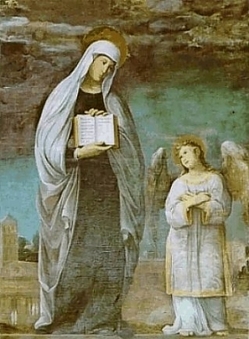 O God, who in Saint Frances of Rome, have given us a model of holiness in married life and of monastic conversion, make us serve you perseveringly, so that in all circumstances we may set our gaze upon you and follow you.
O God, who in Saint Frances of Rome, have given us a model of holiness in married life and of monastic conversion, make us serve you perseveringly, so that in all circumstances we may set our gaze upon you and follow you.
This prayer given by the Church calls to mind the fact that Saint Frances was both married and later lived a monastic vocation! This doesn't happen too often but it shows that it can be done.
Saint Frances is depicted in this picture with an angel resembling her eight-year-old son, Evangelista, who died from the plague. After his death he appeared to her announcing the death of his sister, Agnes.
The trauma of losing one child is great and so imagining the loss of two children would be devasting for a parent but anyone with true humanity. The Lord gave Saint Frances an unusual grace as a result to her faithfulness: that of always seeing her guardian angel. Liturgical scholars will note that the angel is wearing a dalmatic like the deacon at Mass reminding us of the service the angels provide just for the asking. As Pope Benedict mentioned a week ago, the guardian angel is continuously with us, assuring us of the love of Jesus Christ, giving us counsel and providing us with that which is part of the Divine Will. For me and for countless others I think THE grace the guardian angels provide is a guiding light through the darkness of life.
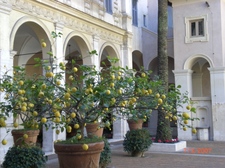 The first intention I am placing before Saint Frances of Rome, the patroness of Benedictine Oblates, is to petition the Lord that the vocation of the Benedictine Oblates be lived with seriousness so that it can be a witness to the Gospel before the world. The second intention is that as Saint Frances had the grace of actually seeing her angel visibly at every moment of every day, so may we come to rely on our guardian angel for living life with the integrity of the Gospel before our eyes.
The first intention I am placing before Saint Frances of Rome, the patroness of Benedictine Oblates, is to petition the Lord that the vocation of the Benedictine Oblates be lived with seriousness so that it can be a witness to the Gospel before the world. The second intention is that as Saint Frances had the grace of actually seeing her angel visibly at every moment of every day, so may we come to rely on our guardian angel for living life with the integrity of the Gospel before our eyes.
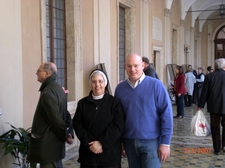 Two years ago I had the privilege of visiting the monastery of Saint Frances of Rome on her feast day. Notice the lemon trees the nuns care for in the above photo. The visit to the monastery was with my friends Father Mark and Sister Barbara.
Two years ago I had the privilege of visiting the monastery of Saint Frances of Rome on her feast day. Notice the lemon trees the nuns care for in the above photo. The visit to the monastery was with my friends Father Mark and Sister Barbara.
Read more on the saint.
Last Thursday, March 5th, two Connecticut state congressmen introduced a bill that proposes to restructure Catholic parish life taking authority away from pastors, the bishop and the pope.
The bill VIOLATES the FIRST AMENDMENT of the US Constitution!!! Read the Bill 1098/2009.
This is a direct attack on the part of these congressmen on the Roman Catholic Church for the Church's teaching the Gospel, especially regarding homosexuality and birth control.
More information to be had on the website of the Roman Catholic Diocese of Bridgeport here and a letter from the archbishop of Hartford.
From the Knights of Columbus
The story at Newstime.com
The truly patient monk is one who has trained his mind to look beyond present pain to ultimate realities. Patience is, accordingly, a work of faith. Without such a vision suffering is meaningless
There is no doubt that negative experience is the great challenge to faith and a source of temptation to abandon one's commitment. It is also true that patience has a purifying effect on faith and commitment and leads to a more naked definition of selfhood.
One who has survived suffering knows that personal integrity is independent of goods and status and owes nothing to the attitudes and actions of others. It is the quality of a heart that has been hammered into humanity by this most universal of human experiences.
Michael Casey, OCSO
Truthful Living
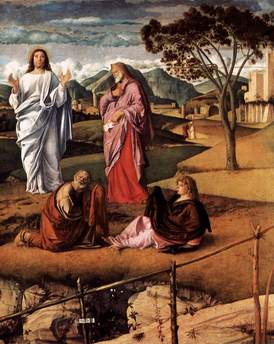 "What does it mean to say: He was transfigured?" asks the Golden-Mouthed Theologian (Chrysostom). He answers this by saying: "It revealed something of His Divinity to them, as much and insofar as they were able to apprehend it, and it showed the indwelling of God within Him." The Evangelist Luke says: "And as He prayed, His countenance was altered" (Luke
"What does it mean to say: He was transfigured?" asks the Golden-Mouthed Theologian (Chrysostom). He answers this by saying: "It revealed something of His Divinity to them, as much and insofar as they were able to apprehend it, and it showed the indwelling of God within Him." The Evangelist Luke says: "And as He prayed, His countenance was altered" (Luke
O God, You commanded us to listen to Your beloved Son, deign to nourish us interiorly by Your word, so that, with our spiritual view having been purified, we may rejoice in the Presence of Your glory.
Your prayers are requested for the peaceful repose of Benedictine monk Father Conall R. Coughlin who fell asleep in the Lord on
Father Conall was a monk for 58 years and a priest for 51; he was given the obediences of being a teacher and a decorated Navy chaplain.
A Mass of Christian Burial was offered this morning with burial in the abbey cemetery at the Abbey of Saint Mary-Delbarton,
Father Conall's obit
In 2008 Georgetown University Philosophy professor Tom L. Beauchamp coauthored Principles of Biomedical Ethics, a widely used book in bioethics courses, in which he sanctions and defends "physician-assisted dying."
According to a Winter 2008 Fellowship of Catholic Scholars Quarterly article by J. Brian Benestad, Beauchamp and his coauthor pronounce unconvincing "some of the arguments against the legalization of 'physician-assisted dying.'" Throughout the book the authors are redefining terms "that used to have nothing to do with administering death-producing drugs," explains Benestad. For them, "Lethal pills are called medication; helping suffering patients to kill themselves is called virtuous (beneficent, just, etc.). Not helping these patients is a failure to respect their dignity." In Principles, the authors state: "We maintain that physician assistance in hastening death is best viewed as part of a continuum of medical care." Benestad counters the argument, citing "the medical profession's devotion to heal and refuse to kill - its ethical center - will be permanently destroyed" by such a policy. (courtesy of the Cardinal Newman Society)
So much for professors at so-called Catholic universities either thinking with the Church or at least not publicly contradicting Catholic teaching. Is this beyond the exercise of academic freedom viz. faith and reason? It's interesting Beauchamp received the Pellegrino Medal in 2004 which honors recipients for contributions made in healthcare ethics following the spirit of the father of the American bioethics movement, Dr. Edmund Pellegrino. Pellegrino is a practicing Catholic and on faculty of Georgetown.
In a Wall Street Journal article Christopher Willcox explains why Archbishop Timothy Dolan will be received by the John Paul Generation. Read the article.
I have no doubt that the Servant of God Pope John Paul II is making his intercession before the Throne of Grace for the Church in
 The Holy See has a webpage for Lent 2009. Among the offerings online are the papal letter for Lent, the information on the stational churches and selections of sacred music to help people worldwide to live this Lent with a spirit of prayer and reflection. Nicely done!
The Holy See has a webpage for Lent 2009. Among the offerings online are the papal letter for Lent, the information on the stational churches and selections of sacred music to help people worldwide to live this Lent with a spirit of prayer and reflection. Nicely done!
 Theirs is the kingdom of heaven who despising a worldly life have attained the rewards of the kingdom, and have washed their robes in the Blood of the Lamb.
Theirs is the kingdom of heaven who despising a worldly life have attained the rewards of the kingdom, and have washed their robes in the Blood of the Lamb.
We beseech You, O Lord our Savior, grant us to revere with unceasing devotion the glorious victories of Your holy Martyrs Perpetua and Felicity; may we at least honor with lowly homage those whose praises we can not sing worthily.
Read more on these third century Martyrs of North Africa. Today's saints have been honored by the Church since the fourth century in Rome. History tells us that Saint Perpetua was of Carthaginian nobility and Saint Felicity was a slave girl but both were equal in their Christian faith. The Roman martyrology says that they were sent to their deaths because of their Christian faith in A.D. 203. Since the wild beasts would not eat them they were put to death by the sword. They are both mentioned in the Roman Canon of the Mass.
Voters in the State of
As a result of last year's state ballot Initiative 2000, terminally ill patients in
Suicide is a tragedy. People who elect to do this act are not thinking in a right manner and are looking for a way out of their pain, sometimes they say they want to ease the pain of loved ones who care for them. Whatever the reason for acting this way is, their desperation leads to a permanent self-inflicted act leading to their intended death. Suicide prematurely and violently leaves loved ones to pick up the pieces post-mortem. Many are physically, emotionally and spiritually exhausted from their health issues which is understandable: chronic illness can be painful but suicide is an inadequate way to deal with the harsh reality of life.
The Church's teaching is: "Suicide contradicts the natural inclination of the human being to preserve and perpetuate his life. It is gravely contrary to the just love of self. It likewise offends love of neighbor because it unjustly breaks the ties of solidarity with family, nation, and other human societies to which we continue to have obligations. Suicide is contrary to love for the living God" (Catechism, 2281).
But quoting the Catechism is insufficient in dealing with the issue at hand. Let's not be confused: we need to know and follow what the Church teaches. Her wisdom is immensely reliable and it ought to form our conscience. Here I want to raise the matter of dealing with the issue pastorally, lovingly with courage and strength. No statement of teaching is going to ease the pain of illness or feelings of desperation. Only the love and mercy of the one who made us can do that. The Lord loves and cherishes each one of us, and He gives the grace to sustain us until the moment of natural death. The Lord knows our pain and our human struggle because He is a man. What the
Responding to the poignant human need of those who face the hard fact of someone taking their own life, the Catholic Information Service commissioned a booklet dealing with this subject. It was our effort to help those who are looking for truth and love and the assistance of the Church. You can order a copy of Coping with a Suicide: Catholic Teaching and Pastoral Practice by emailing or calling the office (cis@kofc.org or 203.752.4267and tell them you saw the ad here) The feelings of sadness which result from the violence of suicide are never removed from the hearts and minds of the survivors even if they try to believe that Auntie is in a better place (a saccharine nosegay that whitewashes the pain temporarily). While the deceased is in the hands of God and clearly live in His mercy, we can never be presumptuous to believe that it is "alright" because "God will deal with it": the reality life is far more important than me and my own needs. The act of suicide is an act of desperation; the person who does (or thinks of committing the act) acts from feelings of exhaustion, fear, and a false sense of security. Our human response needs to be love. Our response as Christians needs to be one of faithfulness to the Lord who made us and it is He who will call us home, and it is our responsibility to be agents of reconciliation showing mercy and forgiveness.
Saint Bernard, the great Cistercian Abbot, gave a Chapter talk to his monks during Lent. In it he admonished them:
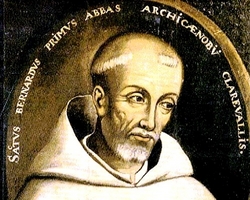 "Observe carefully what you love, what you fear, what makes you rejoice, what causes you to be sad. See whether under your religious habit you have a worldly soul, and whether, hidden by the cloth of conversion, your heart is perverse. The whole of the heart is in these four affections and in these four is comprised, as I see it, all that is involved when you turn to God with your whole heart" (Sermo 2.3 in Quadragesima PL 183: 172D).
"Observe carefully what you love, what you fear, what makes you rejoice, what causes you to be sad. See whether under your religious habit you have a worldly soul, and whether, hidden by the cloth of conversion, your heart is perverse. The whole of the heart is in these four affections and in these four is comprised, as I see it, all that is involved when you turn to God with your whole heart" (Sermo 2.3 in Quadragesima PL 183: 172D).
It is interesting the way Saint Bernard speaks of the heart. Our own Holy Father, Saint Benedict began his Rule for Monasteries by teaching us to listen with the ear of our heart. Listen to the love, fear, rejoicing, and sadness that lie in our heart. The life of the monk allows us to take seriously the heart, and to raise the heart in our prayer. Saint John Damascene put it this way in commenting upon the Transfiguration, an event the Church celebrates this coming Sunday, the Second Sunday of Lent:
Last year the Society of Jesus in
In the spring of 2008 a book of Ivan Petransky about his life was published Zivot pod hviezdou ("A life under a star"). People from around the Jesuit community in Ruzomberok have organized a concert to remember this young brave man who in his early life had written: Amor Christi usque ad oblivionem sui - Love for Christ until self-oblivion. The local TV station has produced a documentary DVD on his life and people are very much interested in the witness this young man has got to offer. Parts of the published book were broadcasted on the Catholic radio station in the country.
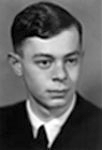 Tomas Munk was born in
Tomas Munk was born in
A point of connection for me with Tomas Munk is that we share the same birth date but 45 years apart from each other, and that we had a love of the Society. May he interceded for all of us.
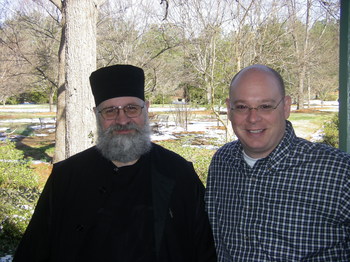 A very dear friend was visiting me at the Abbey this week. Father Michael is an Orthodox monk following the Rule of Saint Benedict at a small monastery called Christminster just outside Toronto, Canada. It was delightful to have him here for a few days; until recently he was on the left coast of these United States and so I am grateful that he's back in the east, well, sort of east....
A very dear friend was visiting me at the Abbey this week. Father Michael is an Orthodox monk following the Rule of Saint Benedict at a small monastery called Christminster just outside Toronto, Canada. It was delightful to have him here for a few days; until recently he was on the left coast of these United States and so I am grateful that he's back in the east, well, sort of east....
The Wiki note on Christminster
I would like to call your attention to the forthcoming retreat for priests that will take place during the Octave of Easter (
"Eight years ago, Msgr. Luigi Giussani, founder of the Movement Communion and Liberation, suggested that the diocesan priests in the
Since 2000, such retreats have been held every year in places associated with the history of the Church in
I strongly recommend that you get in touch with all priests you know - particularly the ones who have shown even a little interest in our experience - and propose them to participate in the retreat. If money is an issue please feel free to let them know that the Knights of Columbus have once more graciously granted some money to help priests to participate.
For any further information please contact Olivetta (clnationaloffice@clhac.com or at 914-548-1275).
Tony Blair is defending the place of faith in public discourse and saying that it needs to show itself in action. The some time British Prime Minister entered into full communion with the Catholic Church following his leaving public office.
Can you give reasons for your belief in Jesus Christ? If so, are you truly following Christ and being a good-enough witness of the Gospel and the Church?
Follow Blair's foundation, The Tony Blair Faith Foundation
Part III of Mike Aquilina's "An Introduction to Lent"
Of the three marks of Lent -- prayer, fasting and almsgiving -- almsgiving is surely the most neglected.
And yet, in the only place where the Bible brings all three together, the inspired author puts the emphasis firmly on the last: "Prayer and fasting are good, but better than either is almsgiving accompanied by righteousness ... It is better to give alms than to store up gold; for almsgiving saves one from death and expiates every sin. Those who regularly give alms shall enjoy a full life" (Tobit 12:8-9).
Why is almsgiving better than prayer and fasting? Because it is prayer, and it involves fasting. Almsgiving is a form of prayer because it is "giving to God" -- and not mere philanthropy. It is a form of fasting because it demands sacrificial giving -- not just giving something, but giving up something, giving till it hurts.
Jesus presented almsgiving as a necessary part of Christian life: "when you give alms, sound no trumpet before you, as the hypocrites do in the synagogues and in the streets, that they may be praised by men. Truly, I say to you, they have received their reward. But when you give alms, do not let your left hand know what your right hand is doing" (Matthew 6:2-3). He does not say IF you give alms, but WHEN. Like fasting and prayer, almsgiving is non-negotiable.
The first Christians knew this. "There was no needy person among them, for those who owned property or houses would sell them, bring the proceeds of the sale, and put them at the feet of the apostles, and they were distributed to each according to need" (Acts 4:34-35).
That was the living embodiment of a basic principle of Catholic social teaching, what tradition calls "the universal destination of goods." The Catechism of the Catholic Church puts it succinctly: "The goods of creation are destined for the entire human race" (n. 2452).
But they can't get there unless we put them there -- and that requires effort.
As with prayer and fasting, so with almsgiving. If we have a plan, we'll find it easier to do. Throughout history, many Christians have used the Old Testament practice of "tithing" as a guide -- that is, they give a tenth of their income "to God." In practice, that means giving it to the poor, to the parish, or to charitable institutions.
My friend Ed Kenna, an octogenarian and dad, remembers the day he decided to start tithing. "When I was a senior in high school, back in 1939-40, I read an article on charitable giving in a Catholic newspaper," he recalls. "And it had a lot of testimonies to the fruits of tithing. Breadwinners told how God provided whenever they were in need or had an emergency. I decided, then and there, to start tithing, and I've been doing it ever since."
For Kenna, those 65 years have had their financial ups and downs. He served in the military during World War II, went to college and raised a family of nine children. Through it all, he says, he was often tempted, but he never wavered in his tithing. "There were many times when I reached a point where I said, 'Something has to give -- but I'm not going to give up on my tithing.'"
It's a matter of trusting God, Kenna adds, "and God will not be outdone in generosity."
Jesus said, "It is more blessed to give than to receive" (Acts
He sees the difficult times as God's test of our trust. "It's especially hard in the beginning. On your first paycheck, it hurts. On the second, the pain's a little less. At about the third or fourth, there's no pain at all. You get used to it. It's a habit. But you have to make that firm resolution: I'm gonna do it and not give in."
Kenna, like many others, interprets tithing to mean taking ten percent off the "first fruits" -- gross income, rather than net. He divides this up as "5 percent to the parish and 5 percent to other Catholic institutions." He also gives of his time and has, for many decades, been a volunteer for the St. Vincent de Paul Society.
Indeed, many Catholics extend the concept of almsgiving beyond money to include time and talent as well, donating a portion of these to worthy causes.
In the late fourth century, St. John Chrysostom looked at the good life people were living in the imperial court, and he was filled with righteous anger. In the name of God, he raged against those who owned toilet seats made of gold, while other people starved in cold hovels.
While our commodes may be made of less precious materials, many Americans today enjoy a better standard of life than any Byzantine emperor ever knew. Central heat, central air conditioning, electric lights, consistently safe food and water, antibiotics, and even aspirin -- these are luxuries beyond the dreams of our ancient ancestors.
We are living high, but are we giving high?
It's a good question to ask ourselves during Lent. It is a scandal, after all, for Christians to have closets overstuffed with clothing when there are families who are shivering because they can't pay their heating bill. It is a scandal for Christians to be epidemically overweight when they have near neighbors who go to bed hungry.
We need to give to God -- whom we meet in our neighbor -- until these problems go away. Whatever we give, whether it's a tenth or a twentieth or half, is symbolic of the greater giving that defines the Christian life. As God gave himself entirely to us, so we give ourselves entirely to Him. In the Eucharist, He holds nothing back. He gives us His body, blood, soul and divinity -- everything He has. That's the giving we need to imitate.
Charity begins at home, where we daily make the choice to give our time, our attention, our affirming smile, and give generously. But charity must not stop there, because for Catholics "home" is universal, and our family is as big as the world. We need to dig deep and give much where much is needed. But, whenever possible, our charity should also involve personal acts, not just automatic withdrawals from our bank account. Pope John Paul asked us to see, and be seen by, "the human face of poverty."
We give what we have till we have nothing left to give. My friend and sometime co-author Regis Flaherty remembers his sister Pat as a woman who practiced giving all her life, to her sibilings, her husband, her children and her friends. To the end, she gave what she could. "When she was dying she was in and out of consciousness, but whenever she looked up at us, she would invariable smile -- absolutely amazing considering how much she was suffering."
Sometimes all we can give is a smile, but sometimes that is the greatest sacrifice, the greatest prayer, and indeed the most generous and most sacrificial alms.
"The Portsmouth Institute is a summer conference, study, recreation and retreat center for Catholic intellectuals, scholars and all those who are interested in questions pertaining to Catholic leadership, life and service in the 21st century."
 What is labeled as "
What is labeled as "
 The Institute's webpage indicates that
The Institute's webpage indicates that
Initial funding for The Portsmouth Institute has been established with generous contributions from National Review Institute, the William E. Simon Foundation, the Healey Family Foundation and other generous alumni and friends. Accepting the role of director is Jamie MacGuire, Senior Development Officer of the
The Portsmouth Institute will feature leadership and participation by
The Institute's inaugural conference will be "The Catholic William F. Buckley Jr.: In Gratitude"
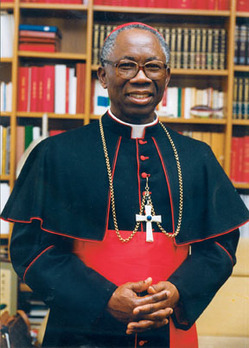 From March 1-7 you won't be seeing too much Vatican activity since many, if not all, of the curial officials (the people who run the various Vatican offices for Pope's apostolic ministry) are making their annual Lenten retreat. This year the retreat is being preached by Francis Cardinal Arinze, prefect emeritus of the Congregation for Divine Worship and the Discipline of the Sacraments on the theme of "The priest encounters Jesus and follows him."
From March 1-7 you won't be seeing too much Vatican activity since many, if not all, of the curial officials (the people who run the various Vatican offices for Pope's apostolic ministry) are making their annual Lenten retreat. This year the retreat is being preached by Francis Cardinal Arinze, prefect emeritus of the Congregation for Divine Worship and the Discipline of the Sacraments on the theme of "The priest encounters Jesus and follows him."
Cardinal Arinze was interviewed by the
Why did you choose this theme for the retreat of the Pope?
Cardinal Francis Arinze: I thought that in the meeting and following of Jesus, we are able to see a summary of all Christianity. On one side there is Jesus who calls us. On the other, we have with us our response: the encounter, so we follow and this becomes a program for life. It was like that for the first apostles: Jesus saw them and told them to follow him. In the following there includes listening to his teaching, miracles, prayer.
We can say that the apostles have completed three years in seminary and the rector was the Son of God. But the call of Jesus is not only for the priests.
Certainly, the reflections that are offered to the Pope are not only for priests but apply to everyone, because Christianity is about the encounter of Jesus with everyone. Everyone can apply it to himself, according to his vocation and mission. And each can give a different answer.
Among the disciples, there were those who immediately left their nets and became his disciples. But there were also those who remained attached to material things, asked for time, and wanted to first return to their loved ones before leaving.
Since then, two thousand years have passed. Can the man of today still meet Jesus?
If you want to, you can meet him, but always two major obstacles must be overcome. The first is superficiality, distraction. And the second is fear. Pontius Pilate is the paradigm of those who are afraid to face the truth. Jesus speaks to him, but he's afraid. He says, "I have come to bear witness to the truth." And Pilate asks, "What is truth?"
But his question is not that of a philosopher who is awaiting the reply. It's one asked without listening, without waiting, without realizing that the truth is right in front of him. Even today many people are missing an appointment with the truth, because they are afraid of what Jesus is and his message. They do not realize that faith is not an obstacle to existence, but a promise of life and truth that goes beyond what is contingent.
Where can this meeting take place?
One of the key places -- not physical but spiritual -- is prayer. Prayer is to leave a space of silence for God, not only externally, but especially internally. You listen. The meditations I am giving the Pope will speak particularly of this, and will remember the long hours of prayer that Jesus spent alone, and will emphasize that the question the disciples asked: "Lord, teach us to pray".
Another meeting place is in scripture: Jesus is the Word of God who became man. Scripture is the written Word of God. When we read the Bible and when we proclaim it during the liturgy, it is God who speaks. The Gospel is not a dusty book of the past. It is the voice of God today.
A third place is the Church, the Mystical Body of Christ. He himself has chosen this as the first pillar, he has given his guarantee that she will always be with you and has promised her the Holy Spirit. In the meditations I will emphasize this dimension: the Church is the Body of Christ, with Christ as the head. This is reflected in the liturgy where we meet Jesus, really and substantially, through Eucharistic communion. It is recognized in charity, especially towards the sick, the elderly, refugees, the poor. Jesus can speak in all these situations. Paul told us that the Church looks at the face of every suffering person and sees Jesus. We do not expect that Jesus will appear, because we are already close to him.
If for the Christian encountering Jesus means to follow Him, what happens when such an attitude of discipleship is missing from the priest?
It is Jesus who gives meaning to the life of the priest. Without him, the priest cannot understand, he no longer makes sense. I would say that his vocation becomes like a farce. For those who, in fact, celebrate, preach, and work?
Of course, it is possible that there are deficiencies in priests. Not all priests have been, and are, saints. The Gospel does not hide the weaknesses and falls of the disciples of Christ. There were those who asked Jesus to set fire to a city of
And then there is Judas Iscariot, who was with Jesus, but didn't love him. He hardened his heart, closed it to him. This demonstrates that the human heart can fail, that the freedom given by God can be misused. In the history of the Church, unfortunately this has happened other times.
Can the penitential dimension of Lent help a priest renew his experience of his encounter with Christ?
Yes, starting with the act of receiving the ashes, which means to accept being sinners. The Church asks to pray a lot during Lent not only as a sign of adoration to God but also to repent of sins committed. It is not enough to receive forgiveness from God, we must also recognize that we have offended the love of God.
And then there is fasting to which the Pope has dedicated his Lenten message. It is today seen just as a gesture, but it should be understood in the proper meaning. Its true meaning is doing something pleasing for others such as sharing goods with the poor.
Solidarity with the suffering is also a way to show the authenticity of our Eucharistic celebration. At the end of Mass the priest says: Go and live what has been celebrated, heard, meditated and prayed. Helping those who are elderly, alone, imprisoned, disabled, is a way to live the Eucharist.
Benedict XVI clearly says this in Deus Caritas Est: If the Eucharist does not translate into works of charity it is fragmented, incomplete.
But shouldn't we still recall the sobriety with which the Pope has re-launched his message of this year?
To fast is to accept that we are sinners. You do without something. It is also a means of spiritual 'training', similar to what athletes practice in order to succeed in a sport.
Then there is the most dynamic dimension, which is precisely that of helping the poor. Spend less and help our brothers who have not: it is the lifestyle advocated by the Pope in his message for World Day of Peace this year. The Christian spirit must go in the opposite direction with respect to unfettered consumerism.
Having beliefs and cabinets that are full -- full of things that often we do not need or use just a few times -- is an insult to the poor.
Here's part II of Mike Aquilina's "An Introduction to Lent." The question came from a non-Catholic Boy Scout in my son's troop. We had spent a long, soggy weekend in the middle of the woods. And now, Sunday morning, the adults announced that breakfast would be delayed so that the Catholics could keep the Communion fast. He was not a happy camper. His question comes to mind again as Lent begin, because fasting is the most distinguishing practice of the season. On two days in Lent, Ash Wednesday and Good Friday, Catholics limit their eating to one full, meatless meal. On all the Fridays of Lent we abstain from meat. Why do Catholics fast? Our reasons find firm grounding in the Bible. When we fast, we follow holy example. Moses and Elijah fasted forty days before going into God's presence (Exodus 34:28, 1 Kings 19:8). Anna the Prophetess fasted to prepare herself for the coming of the Messiah (Luke 2:37). They all wanted to see God, and they considered fasting a basic prerequisite. We, too, wish to enter God's presence, so we fast. Jesus fasted (Matthew 4:2). And since He needed no purification, He surely did this only to set an example for us. In fact, He assumed that all Christians would follow His example. "When you fast," he said, "do not look gloomy like the hypocrites. They neglect their appearance, so that they may appear to others to be fasting" (Matthew 6:16). Note that He did not say "IF you fast," but "when." And WHEN is now. In Lent the Church extends the idea of fasting, beyond the minimal skipping of meals, to a more far-reaching program of self-denial. Jesus said: "If any man would come after me, let him deny himself ... daily" (Luke 9:23). So we "give up" something that we'd ordinarily enjoy: sweets, soda pop, a favorite TV show, or the snooze alarm. Fasting has its health benefits, but it's not the same as dieting. Fasting is something spiritual and far more positive. Fasting is a spiritual feast. It does for the soul what food does for the body. The Bible spells out specific spiritual benefits of fasting. It produces humility (Psalm 69:10). It shows our sorrow for our sins (1 Samuel 7:6). It clears a path to God (Daniel 9:3). It is a means of discerning God's will (Ezra 8:21) and a powerful method of prayer (8:23). It's a mark of true conversion (Joel 2:12). Fasting helps us to be detached from the things of this world. We fast, not because earthly things are evil, but precisely because they're good. They're God's gifts to us. But they're so good that we sometimes prefer the gifts to the Giver. We practice self-indulgence rather than self-denial. We tend to eat and drink to the point where we forget God. Such indulgence is really a form of idolatry. It's what St. Paul meant when he said, "their god is the belly ... with minds set on earthly things" (Philippians 3:19). How can we enjoy God's gifts without forgetting the Giver? Fasting is a good way to start. The body wants more than it needs, so we should give it less than it wants. Saint John of the Cross said that we cannot rise up to God if we are bound to the things of this world. So we give up good things, and gradually we grow less dependent on them, less needy. All of this is part of our preparation for heaven. For we're destined to lose our earthly goods anyway. Time, age, illness and "doctor's orders" can take away our taste for chocolate, our ability to enjoy a cold beer, and even the intimate embrace of a loved one. If we have no discipline over our desires, then these losses will leave us bitter and estranged from God. But if we follow Jesus in self-denial, we'll find a more habitual consolation in the ultimate good -- God Himself. How is it that some people are able to remain serene and cheerful amid extreme suffering and even when facing imminent death? It's not just a matter of temperament. They've prepared themselves for the moment by giving up the things of this world, one small thing at a time. They've grown so accustomed to small sacrifice that the big one isn't such a stretch. No one says that fasting is easy. In fact, says Benedictine Father Thomas Acklin, author of The Passion of the Lamb: God's Love Poured Out in Jesus. "Fasting can seem very hard, and it can seem that if I do not eat I will become weak and will not be able to work, or pray, or do anything. "Yet there is that marvelous moment," he adds, "when, after some hours have passed, my stomach has stopped growling and I've even forgotten what I've given up, when there is a lightness, a freedom, a clarity of the senses and a brightness of attitude and feeling, an incomparable closeness to the Lord." Lent is a special season, but God wants these forty days to have a lasting effect on our lives. So, in a sense, fasting is for always. Father Rene Schatteman, an Opus Dei chaplain in Pittsburgh, says that he received this lesson directly from a canonized saint. "I learned from St. Josemaria Escriva, whom I had the privilege of knowing personally, that a person should make some small sacrifice at each meal, always, and not just during Lent." Fr. Schatteman emphasizes the importance of little things, and the big effect they can have: "We should all feel the need to help Christ redeem the world by practicing self-denial in everyday, ordinary eating and drinking ... to take a bit less, or a bit less of what we like most, to avoid eating between meals, to skip a snack or dessert, etc., without making a big deal of it." A Pittsburgh businessman (who asked for anonymity) told me of his longtime practice of fasting on Fridays, "a 12-15 hour fast from food, water-only." He said, however, that this can be difficult to carry out, not because of the hunger, but because it can disrupt family life. "It's very hard to sit at the family table and not eat. It's not so much a question of resisting the temptation of the food. I always felt like I was breaking fellowship. My fasting actually felt selfish, like I was taking something away from our time together as a family." He has since modified his fast, "to be broken at the family dinner in the evening." Why do Catholics fast? Our anonymous businessman put it well: "It's medicine for my biggest problem -- selfishness and lack of self-control. To force myself to curb my appetites, to not satisfy my desires -- even for a short period of time -- this is a good thing. To offer up the little sacrifice to God, for my family, for people who are hungry through no choice of their own, this I think is also good."
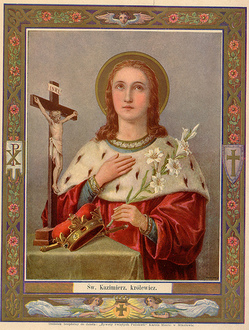 All-powerful God, to serve You is to reign: by the prayers of Saint Casimir, help us to serve You in holiness and justice.
All-powerful God, to serve You is to reign: by the prayers of Saint Casimir, help us to serve You in holiness and justice.
He was the son of King Casimir IV and Queen Elizabeth, monarchs of
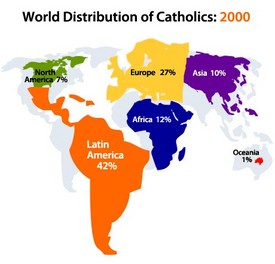 According to the recently published Annuario Pontificio, the papal yearbook we see the number of Catholics in the world has increased by 1.4%, with particularly in
According to the recently published Annuario Pontificio, the papal yearbook we see the number of Catholics in the world has increased by 1.4%, with particularly in
The Press Office of the Holy See stated that the worldwide Catholic Church included 1.147 billion people in 2007, a 16 million increase since 2006, and compared with the map to the right, the current numbers are significant. The numbers of baptized grew significantly in
One notices moderate growth in the number of priests which according to those in the know, this trend began in 2000 after more than 20 years of steady losses. The year ending in 2007 saw the presbyterate rise from 405,000 to 408,000.
The statistical information is based on gather stats from 2007.
The BBC has an article on the increase of Catholic priests, read about it here.
The Anglican Church of Canada (ACoC) published their 2009 Lenten reflection that portrays Jesus as a racist who reformed himself after being challenged by the Canaanite woman (see St. Matthew's Gospel). The ACoC was apparently hijacked by the politically correct establishment who teaches in this "reflection" Jesus is a sinner. Well, this is a basic heresy. Here's the key point of the reflection:
"... a Canaanite woman from that region came out and started shouting, 'Have mercy on me, Lord, Son of David; my daughter is tormented by a demon.' He answered, 'I was sent only to the lost sheep of the house of
This not a story for people who need to think that Jesus always had it together, because it looks like we've caught him being mean to a lady because of her ethnicity. At first, he ignores her cries. Then he refuses to help her and compares her people to dogs.
But she challenges his prejudice. And he listens to her challenge and grows in response to it. He ends up healing her daughter. What we may have here is an important moment of self-discovery in Jesus' life, an enlargement of what it will mean to be who he was. Maybe we are seeing Jesus understand his universality for the first time.
Interesting. The authors of this reflection are the same people who would insist that Jesus' way is true only for us but may be not for everyone. Perhaps the Anglicans of Canada ought to read Dominus Iesus. This reminds me of the Office of Black Catholics in the
Information is available at www.stbedeshall.org.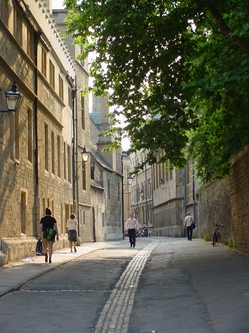 An intensive Ecclesiastical Latin Course is now available in
An intensive Ecclesiastical Latin Course is now available in
Today [March 1st] is the First Sunday of Lent, and the Gospel, with the sober and concise style of St. Mark, introduces us to the climate of this liturgical season: "The Spirit drove Jesus out into the desert, and he remained in the desert for 40 days, tempted by Satan" (Mark 1:12). In the
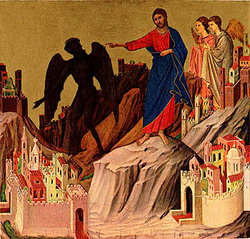 After having received baptism from John, Jesus enters that empty place, led by the Holy Spirit himself, which had descended upon him, consecrating him and revealing him as the Son of God. In the desert, the place of trial -- as the experience of the people of Israel shows -- there appears the dramatic reality of the "kenosis," the emptying of Christ, who is stripped of the form of God (cf. Philippians 2:6-7). He, who did not sin and cannot sin, submits himself to trial and thus can have compassion for our infirmities (cf. Hebrews
After having received baptism from John, Jesus enters that empty place, led by the Holy Spirit himself, which had descended upon him, consecrating him and revealing him as the Son of God. In the desert, the place of trial -- as the experience of the people of Israel shows -- there appears the dramatic reality of the "kenosis," the emptying of Christ, who is stripped of the form of God (cf. Philippians 2:6-7). He, who did not sin and cannot sin, submits himself to trial and thus can have compassion for our infirmities (cf. Hebrews
In the brevity of the account, in the face of this obscure and darksome figure who dares to
 tempt the Lord, the angels, luminous and mysterious figures, fleetingly appear. The Gospel says that the angels "serve" Jesus (Mark
tempt the Lord, the angels, luminous and mysterious figures, fleetingly appear. The Gospel says that the angels "serve" Jesus (Mark
The angels serve Jesus, who is certainly superior to them, and this dignity of his is proclaimed in a clear though discreet way here in the Gospel. Indeed, even in the situation of extreme poverty and humility, when he is tempted by Satan, he remains the Son of God, the Messiah, the Lord.
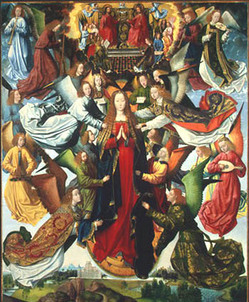 Dear brothers and sisters, we would take away a significant part of the Gospel if we left aside these beings sent by God to announce his presence among us and be a sign of that presence. Let us call upon them often, that they sustain us in the task of following Jesus to the point of identifying ourselves with him. Let us ask them, especially today, to watch over me and my co-workers in the Roman Curia as we begin our retreat this week, as we do every year. Mary, Queen of Angels, pray for us!
Dear brothers and sisters, we would take away a significant part of the Gospel if we left aside these beings sent by God to announce his presence among us and be a sign of that presence. Let us call upon them often, that they sustain us in the task of following Jesus to the point of identifying ourselves with him. Let us ask them, especially today, to watch over me and my co-workers in the Roman Curia as we begin our retreat this week, as we do every year. Mary, Queen of Angels, pray for us!
Pope Benedict XVI
1 March 2009, First Sunday of Lent
St Peter's Square
PS: You may want to read the booklet, "All About Angels" published by the Catholic Information Service.
 The President of the United States of America needs to realize not everyone supports Planned Parenthood's goals. Please follow this suggestion if you are against abortion. Please send this message to everyone in your address book that thinks similarly. MAYBE our biased MEDIA would even mention it IF we DO IT. Mark March 31 on your calendar!
The President of the United States of America needs to realize not everyone supports Planned Parenthood's goals. Please follow this suggestion if you are against abortion. Please send this message to everyone in your address book that thinks similarly. MAYBE our biased MEDIA would even mention it IF we DO IT. Mark March 31 on your calendar!
What: Get red envelopes or postcards and mail them on March 31st to the White House; You can buy them at Kinkos, or any party supply stores.
When: March 31, 2009
To Whom:
President Barack Obama
The White House
On the back, write the following message:
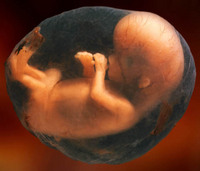 This envelope represents one child who died because of an abortion. It is empty because the life that was taken is now unable to be a part of our world.
This envelope represents one child who died because of an abortion. It is empty because the life that was taken is now unable to be a part of our world.
We will mail the envelopes out
Forward this event to every one of your friends who you think would send one too. It would be good if we could send 50 million red envelopes, one for every child who died [in the
It may seem that those who believe abortion is wrong are in a minority. It may seem like we have no voice and it's shameful to even bring it up. Let us show our President and the world that the voices of those of us who do not believe abortion is acceptable are not silent and must be heard. Together we can change the heart of The President and save the lives of millions of children.
 President Barack Obama spoke at a Planned Parenthood Action Fund event, uttering the now infamous line, "Well, the first thing I'd do as president is, is sign the Freedom of Choice Act. [Applause.] That's the first thing that I'd do."
President Barack Obama spoke at a Planned Parenthood Action Fund event, uttering the now infamous line, "Well, the first thing I'd do as president is, is sign the Freedom of Choice Act. [Applause.] That's the first thing that I'd do."
An empty red envelope will send a message to President Barack Obama that there is moral outrage in this country over this issue [The Freedom of Choice Act, which will essentially "undo" every law currently in place to limit abortion in the U.S. (i.e., parental consent laws, parental notification, waiting periods, prohibition of transporting a minor girl across state lines to obtain an abortion, etc.)]. It will be quiet, but clear.
Please read more about The Freedom of Choice Act here:
http://www.lifenews.com/nat4359.html
http://www.jillstanek.com/archives/2008/07/one_year_annive.html
Mike Aquilina's 2007 "
It's not so much by the ash mark on your forehead or fish marks on the calendar. Tradition tells us that Lent has three distinguishing marks: prayer, fasting and almsgiving.
This three-part series will examine those practices. Prayer is surely the best place to begin, because it's the one that unites them all. Fasting and almsgiving are themselves just forms of prayer.
There are two classic definitions of prayer. The one in most catechisms comes from St. John of Damascus (eighth century): "Prayer is the raising of the mind and heart to God." The other comes from St. Clement of
In prayer we talk to God, and He talks to us. As in any relationship, this conversation takes many forms. Think of all the ways a husband and wife communicate: formal marriage vows, casual chat, winks across a crowded room, affectionate caresses, and phrases they never tire of repeating.
Our communication with God includes a similar range of expressions -- set phrases, quiet conversation, gestures such as the Sign of the Cross, and the intimate embrace of the sacraments. Just as a man and woman grow in love by repeating "I love you," so we Christians grow in love by repeating the Church's prayers.
Prayer comes in many forms and styles. These are usually divided into "vocal" and "mental" prayer. The categories are helpful, but not watertight. All prayer, after all, should involve our mind; so, in a sense, all prayer is mental prayer. Modern writers sometimes speak of the two types as formal prayer and spontaneous prayer.
Again, such distinctions are useful; we should, however, step beyond them for a moment. When we look at all prayer as conversation, it can change the way we go about it. Thinking of prayer as conversation can help us also to overcome obstacles -- such as distractions, dryness, inability to focus -- because all these things also come up in human conversation.
Prayer is a conversation that never ends. In the Scriptures,
That seems to be asking a lot, but it's really the best way to think about it. If we are to pray this way, we have to form the habit of prayer. And, like any good habit or skill, prayer requires a sustained effort, over time, with much repetition.
Many people bristle when they hear about discipline in prayer. They think prayer should always be spontaneous. And sometimes prayer does come spontaneously, as when we experience some great joy or great sorrow. But spontaneity is most often the fruit of discipline. It is usually the best-trained musicians who are able to improvise freely. To do anything well takes time, dedication and patient endurance through sometimes-tedious exercises.
The most effective way to discipline our prayer life is by following a program, a schedule of sorts -- what the late Cardinal Joseph Bernardin called "a game plan for the Christian." The best time to set up such a plan is during Lent.
A "plan of life" is a firm but flexible program that schedules our prayer amid the ordinary duties of work, family life and social activity. A daily plan should include some vocal prayers, such as the Rosary or other devotions; plus reading of the Bible and some spiritual book (the writings of the saints are best); attendance at Mass (at least on Sundays and holy days, but more often if possible); and quiet time for more focused conversation with God in mental prayer. The best place for this prayer is in church, before Jesus in the tabernacle.
"Prayer first means God is speaking to us and not the other way around," says Father Kenneth Myers, a priest of the Diocese of Pittsburgh. "That requires silence -- the art of listening carefully to the Lord. And the best place to do that is in the presence of the Blessed Sacrament. Prayer before the Blessed Sacrament requires real effort and commitment, but even when our hearts are dry and it seems fruitless to keep on praying, being before the Eucharistic Lord is like being in the sunlight -- even by doing nothing we still absorb those powerful rays of light."
Our plan should also include weekly or monthly practices, such as confession, fasting, almsgiving and so on.
It helps to set standard times, or to key each practice to other activities, so that we never forget. We can keep our spiritual book by the coffee pot and read while the java is brewing every morning. We can use the beginning of our lunch hour as a reminder to say the Angelus. We can pray the Rosary while waiting for the bus home in the evening. We can listen to ten minutes of the Bible on tape as we drive.
We should plant prayers throughout the day like vines. Put one here, one there -- and pretty soon, like ivy on a wall, our prayer will cover our day.
This is how Jesus modeled prayer for us. His own prayer life was rich and varied. Sometimes He offered formal prayers (Mark
The first Christians followed their Lord in all these practices, and so do we.
Not that it's always easy to do. But the formal quality of prayer helps us know what to do when we meet with obstacles. "Never, Never, never, never give up!" says my friend Steve Galvanek. A systems analyst, husband and dad, Steve says his plan sustains him even when he's tired and preoccupied. "If in my feeble attempts to say a Rosary, I manage just one or two heartfelt Hail Marys, that's far better than if I hadn't tried at all"
Even the more unpleasant and difficult things in life can become reminders to pray. The key is to think of them as opportunities rather than obstacles. Another friend of mine, Sarah Scott, admits that it's hard to find time to pray. She's a mother of five, owner of a home-based business and volunteer at her children's Catholic school. "It helps to offer everything up all the little things that you don't like to do," she says. "I hate folding laundry. But, instead of getting annoyed about it, I try to offer it up and think about what other people have to deal with. Efforts like this keep me talking with God throughout the day."
Sounds like a plan.
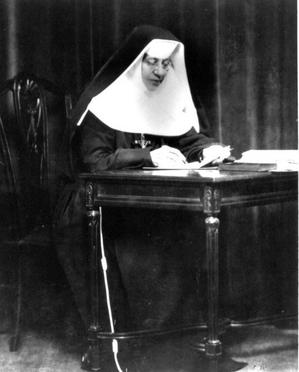 Born in
Born in
First sister to profess vows as a Sister of the Blessed Sacrament on
Died on
Beatified on
Canonized on
Ever-loving God, You called Saint Katharine Drexel to teach the message of the Gospel and to bring the life of the Eucharist to the African American and Native American peoples. By her prayers and example, enable us to work for justice among the poor and the oppressed, and keep us undivided in love in the eucharistic community of Your Church.
Saint Katharine's connection to Maryhelp - Belmont Abbey is that she used a portion of her personal wealth to help build a number of churches, including the abbey church, for the first abbot of Maryhelp, Abbot-bishop Leo Haid. She also visited the abbey. So, we can say that a saint walked on this soil! A sign in the Abbey Basilica narthex commemorates this fact. May Saint Katharine continue to intercede for us and help us to know the Lord.
Franciscan Friar? You? The NY Post as the story...read the article...the approach is trendy but it may be helpful. Listen to the NPR article... Don't know till you try.... What would Saint Francis say? Visit the Holy Name Province of the Franciscans webpage or the vocation's page.
Eugenio Maria Giuseppe Giovanni Pacelli
Born on
Ordained priest Easter
Ordained bishop on
Created Cardinal
Reigned as the 260th pontiff of the Holy Roman Church
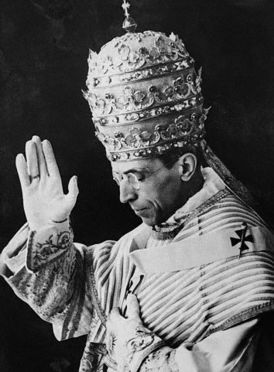 God, Who, in Thine ineffable providence, didst will that Thy servant Pius XII should be numbered among the high priests, grant, we beseech Thee, that he, who on earth held the place of Thine only-begotten Son, may be joined forevermore to the fellowship of Thy holy pontiffs. Through the same Jesus Christ, Thy Son, Who liveth and reigneth with Thee in the unity of the Holy Ghost, God, world without end.
God, Who, in Thine ineffable providence, didst will that Thy servant Pius XII should be numbered among the high priests, grant, we beseech Thee, that he, who on earth held the place of Thine only-begotten Son, may be joined forevermore to the fellowship of Thy holy pontiffs. Through the same Jesus Christ, Thy Son, Who liveth and reigneth with Thee in the unity of the Holy Ghost, God, world without end.
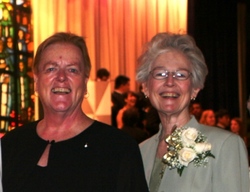 Today, I learned of the death of a former professor of mine, Sister Marygrace "Ginger" Peters, OP (on the left in the picture). Sister Marygrace died on Feb 21, 2009 after a long battle with lung cancer. Of late she was the Prioress General of the Houston Dominican Sisters.
Today, I learned of the death of a former professor of mine, Sister Marygrace "Ginger" Peters, OP (on the left in the picture). Sister Marygrace died on Feb 21, 2009 after a long battle with lung cancer. Of late she was the Prioress General of the Houston Dominican Sisters.
When I was doing studies in St. Louis, MO, I had five classes at Aquinas Institute of Theology, for one of the classes Sister was my Church History professor. At all times Sister Marygrace was a terriffic presence: happy, faithful, positive and prayerful. All what you would expect and cherish in a Dominican sister. Plus, she was a New Englander which was a consolation many times!
May the soul of Sister Marygrace rest in the peace and love of our Lord!
Ring them bells, for the city that dreams
Ring them bells from the sanctuaries
Cross the valleys and streams
For they're deep and they're wide
And the world's on its side
Ring them bells
For the lines they are long
And they're breaking down the distance
Between right and wrong.
John Donne
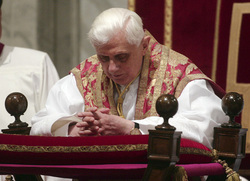 Prayer is a "dialogue with God" and the "engine of the world," Pope Benedict said on Ash Wednesday. He also reminded us that Lent is a journey of conversion that invites all believers to prayer, penitence, and fasting.
Prayer is a "dialogue with God" and the "engine of the world," Pope Benedict said on Ash Wednesday. He also reminded us that Lent is a journey of conversion that invites all believers to prayer, penitence, and fasting.The general intention
That all nations of our world may grow in appreciation of the dignity and value of women and their roles in society.
The missionary intention
That all the bishops, priests, consecrated persons, and laity of the Catholic Church in
